Conceptual Framework and Sustainability Reporting
VerifiedAdded on 2023/03/31
|20
|4347
|77
AI Summary
This report addresses the different aspects of a conceptual framework as per the International Accounting Standards Board (IASB). The report is subdivided into two parts with the first part of the report focusing on the different concepts that are entailed within the conceptual framework of accounting. Further emphasis is attributed to assessing the different limitations and strengths of the framework. The report as well covers the practical look at the G8 Australian listed company and the pick n pay a South African listed company. These are looked at in regards to assessing the use of the conceptual framework when preparing financial reports. A literature review of the framework is as well presented in the report for explanation purposes.
Contribute Materials
Your contribution can guide someone’s learning journey. Share your
documents today.
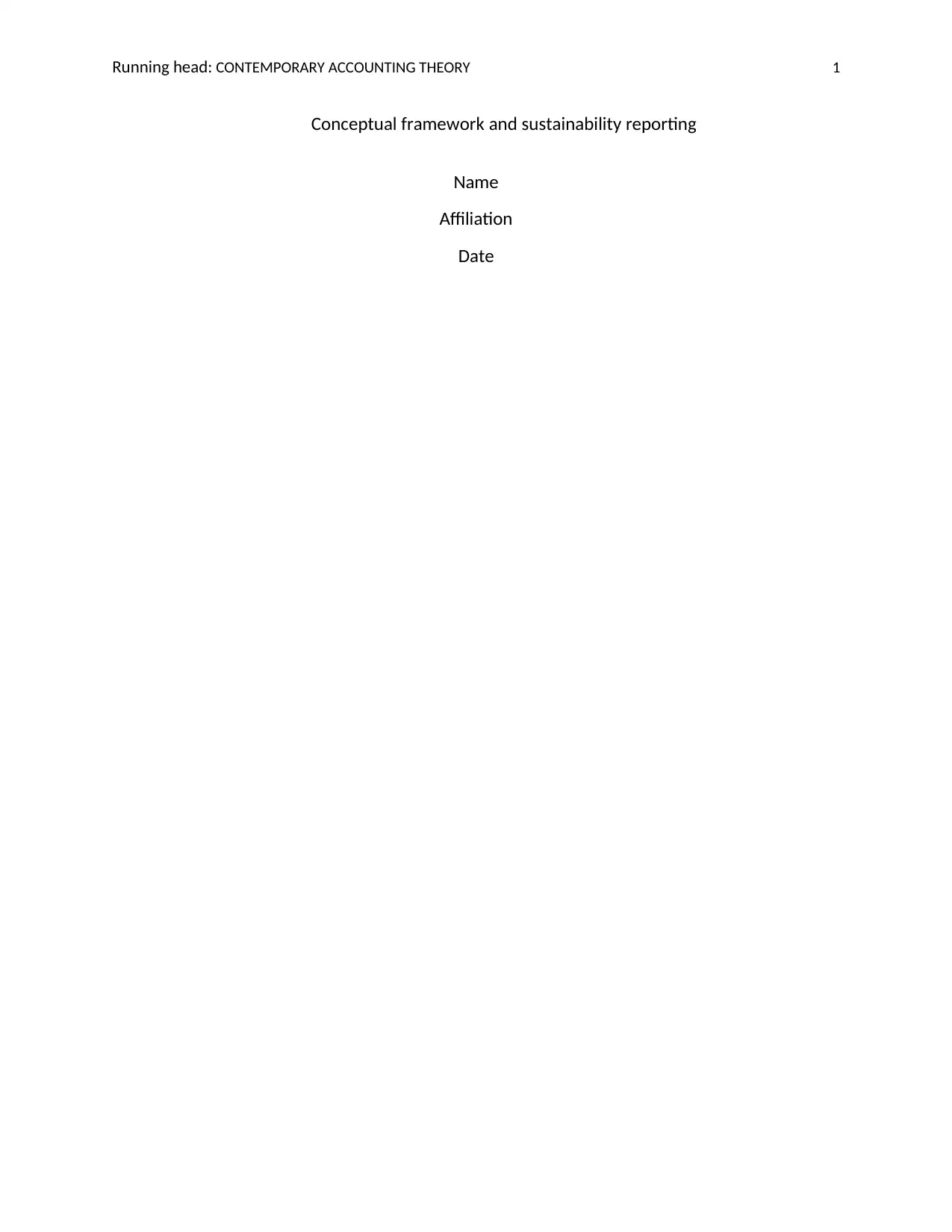
Running head: CONTEMPORARY ACCOUNTING THEORY 1
Conceptual framework and sustainability reporting
Name
Affiliation
Date
Conceptual framework and sustainability reporting
Name
Affiliation
Date
Secure Best Marks with AI Grader
Need help grading? Try our AI Grader for instant feedback on your assignments.
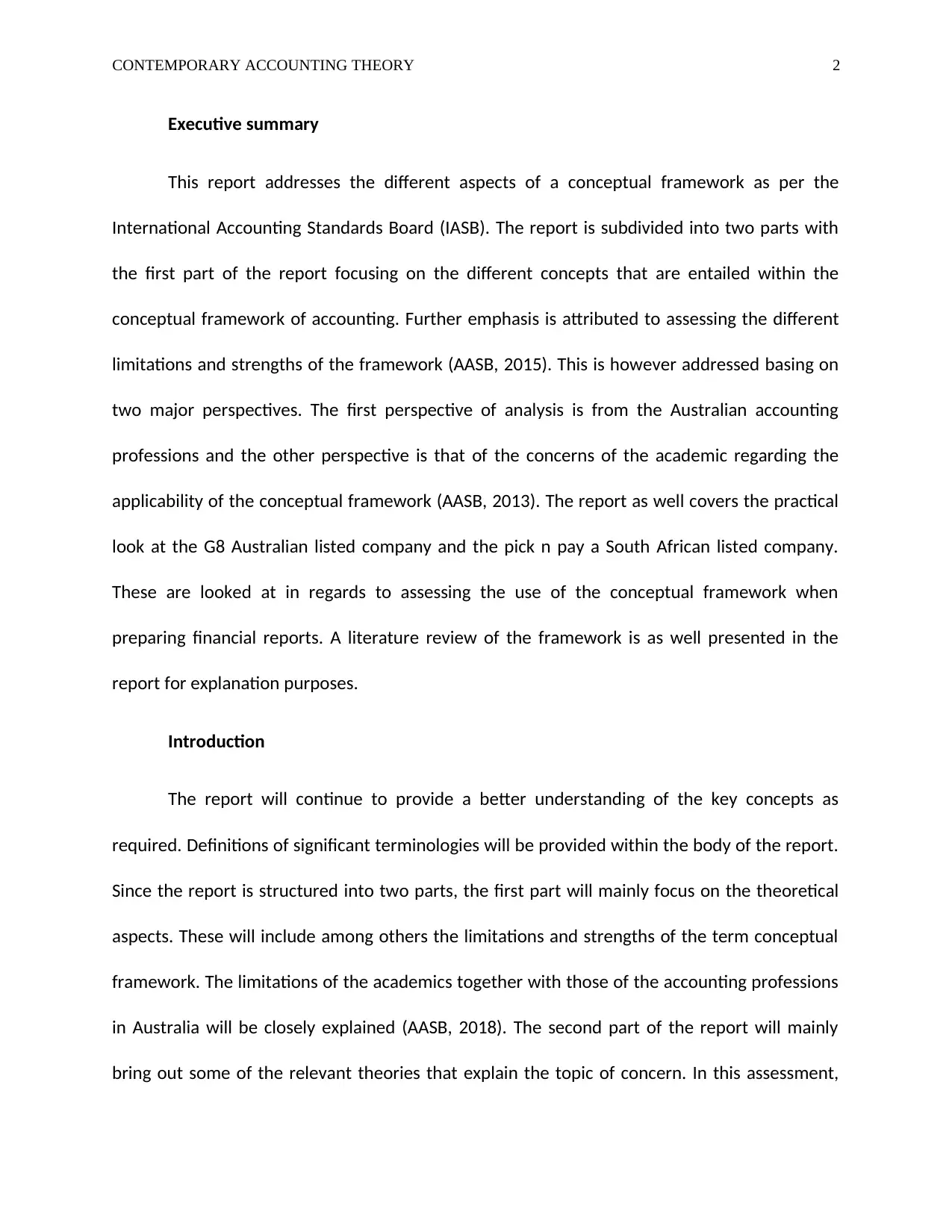
CONTEMPORARY ACCOUNTING THEORY 2
Executive summary
This report addresses the different aspects of a conceptual framework as per the
International Accounting Standards Board (IASB). The report is subdivided into two parts with
the first part of the report focusing on the different concepts that are entailed within the
conceptual framework of accounting. Further emphasis is attributed to assessing the different
limitations and strengths of the framework (AASB, 2015). This is however addressed basing on
two major perspectives. The first perspective of analysis is from the Australian accounting
professions and the other perspective is that of the concerns of the academic regarding the
applicability of the conceptual framework (AASB, 2013). The report as well covers the practical
look at the G8 Australian listed company and the pick n pay a South African listed company.
These are looked at in regards to assessing the use of the conceptual framework when
preparing financial reports. A literature review of the framework is as well presented in the
report for explanation purposes.
Introduction
The report will continue to provide a better understanding of the key concepts as
required. Definitions of significant terminologies will be provided within the body of the report.
Since the report is structured into two parts, the first part will mainly focus on the theoretical
aspects. These will include among others the limitations and strengths of the term conceptual
framework. The limitations of the academics together with those of the accounting professions
in Australia will be closely explained (AASB, 2018). The second part of the report will mainly
bring out some of the relevant theories that explain the topic of concern. In this assessment,
Executive summary
This report addresses the different aspects of a conceptual framework as per the
International Accounting Standards Board (IASB). The report is subdivided into two parts with
the first part of the report focusing on the different concepts that are entailed within the
conceptual framework of accounting. Further emphasis is attributed to assessing the different
limitations and strengths of the framework (AASB, 2015). This is however addressed basing on
two major perspectives. The first perspective of analysis is from the Australian accounting
professions and the other perspective is that of the concerns of the academic regarding the
applicability of the conceptual framework (AASB, 2013). The report as well covers the practical
look at the G8 Australian listed company and the pick n pay a South African listed company.
These are looked at in regards to assessing the use of the conceptual framework when
preparing financial reports. A literature review of the framework is as well presented in the
report for explanation purposes.
Introduction
The report will continue to provide a better understanding of the key concepts as
required. Definitions of significant terminologies will be provided within the body of the report.
Since the report is structured into two parts, the first part will mainly focus on the theoretical
aspects. These will include among others the limitations and strengths of the term conceptual
framework. The limitations of the academics together with those of the accounting professions
in Australia will be closely explained (AASB, 2018). The second part of the report will mainly
bring out some of the relevant theories that explain the topic of concern. In this assessment,
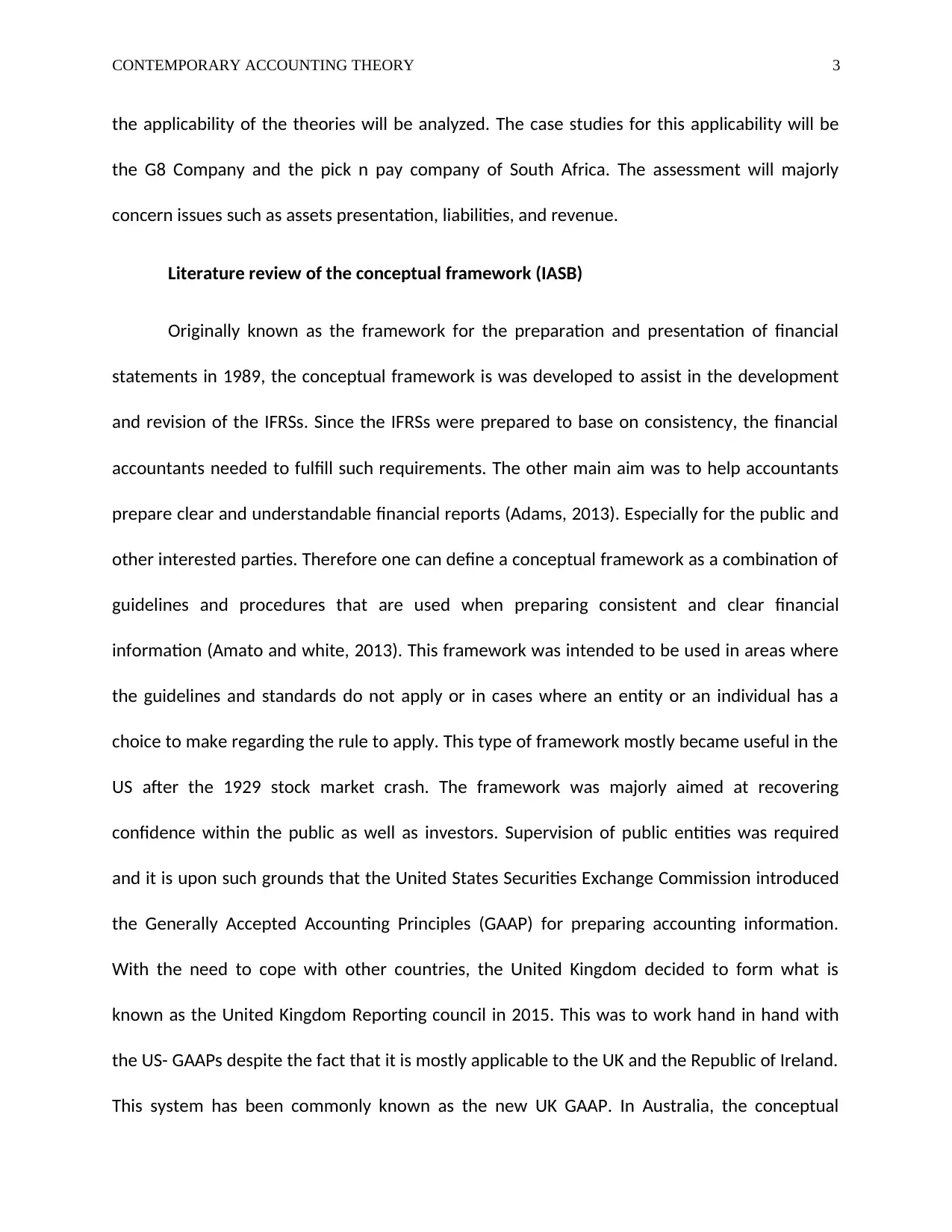
CONTEMPORARY ACCOUNTING THEORY 3
the applicability of the theories will be analyzed. The case studies for this applicability will be
the G8 Company and the pick n pay company of South Africa. The assessment will majorly
concern issues such as assets presentation, liabilities, and revenue.
Literature review of the conceptual framework (IASB)
Originally known as the framework for the preparation and presentation of financial
statements in 1989, the conceptual framework is was developed to assist in the development
and revision of the IFRSs. Since the IFRSs were prepared to base on consistency, the financial
accountants needed to fulfill such requirements. The other main aim was to help accountants
prepare clear and understandable financial reports (Adams, 2013). Especially for the public and
other interested parties. Therefore one can define a conceptual framework as a combination of
guidelines and procedures that are used when preparing consistent and clear financial
information (Amato and white, 2013). This framework was intended to be used in areas where
the guidelines and standards do not apply or in cases where an entity or an individual has a
choice to make regarding the rule to apply. This type of framework mostly became useful in the
US after the 1929 stock market crash. The framework was majorly aimed at recovering
confidence within the public as well as investors. Supervision of public entities was required
and it is upon such grounds that the United States Securities Exchange Commission introduced
the Generally Accepted Accounting Principles (GAAP) for preparing accounting information.
With the need to cope with other countries, the United Kingdom decided to form what is
known as the United Kingdom Reporting council in 2015. This was to work hand in hand with
the US- GAAPs despite the fact that it is mostly applicable to the UK and the Republic of Ireland.
This system has been commonly known as the new UK GAAP. In Australia, the conceptual
the applicability of the theories will be analyzed. The case studies for this applicability will be
the G8 Company and the pick n pay company of South Africa. The assessment will majorly
concern issues such as assets presentation, liabilities, and revenue.
Literature review of the conceptual framework (IASB)
Originally known as the framework for the preparation and presentation of financial
statements in 1989, the conceptual framework is was developed to assist in the development
and revision of the IFRSs. Since the IFRSs were prepared to base on consistency, the financial
accountants needed to fulfill such requirements. The other main aim was to help accountants
prepare clear and understandable financial reports (Adams, 2013). Especially for the public and
other interested parties. Therefore one can define a conceptual framework as a combination of
guidelines and procedures that are used when preparing consistent and clear financial
information (Amato and white, 2013). This framework was intended to be used in areas where
the guidelines and standards do not apply or in cases where an entity or an individual has a
choice to make regarding the rule to apply. This type of framework mostly became useful in the
US after the 1929 stock market crash. The framework was majorly aimed at recovering
confidence within the public as well as investors. Supervision of public entities was required
and it is upon such grounds that the United States Securities Exchange Commission introduced
the Generally Accepted Accounting Principles (GAAP) for preparing accounting information.
With the need to cope with other countries, the United Kingdom decided to form what is
known as the United Kingdom Reporting council in 2015. This was to work hand in hand with
the US- GAAPs despite the fact that it is mostly applicable to the UK and the Republic of Ireland.
This system has been commonly known as the new UK GAAP. In Australia, the conceptual
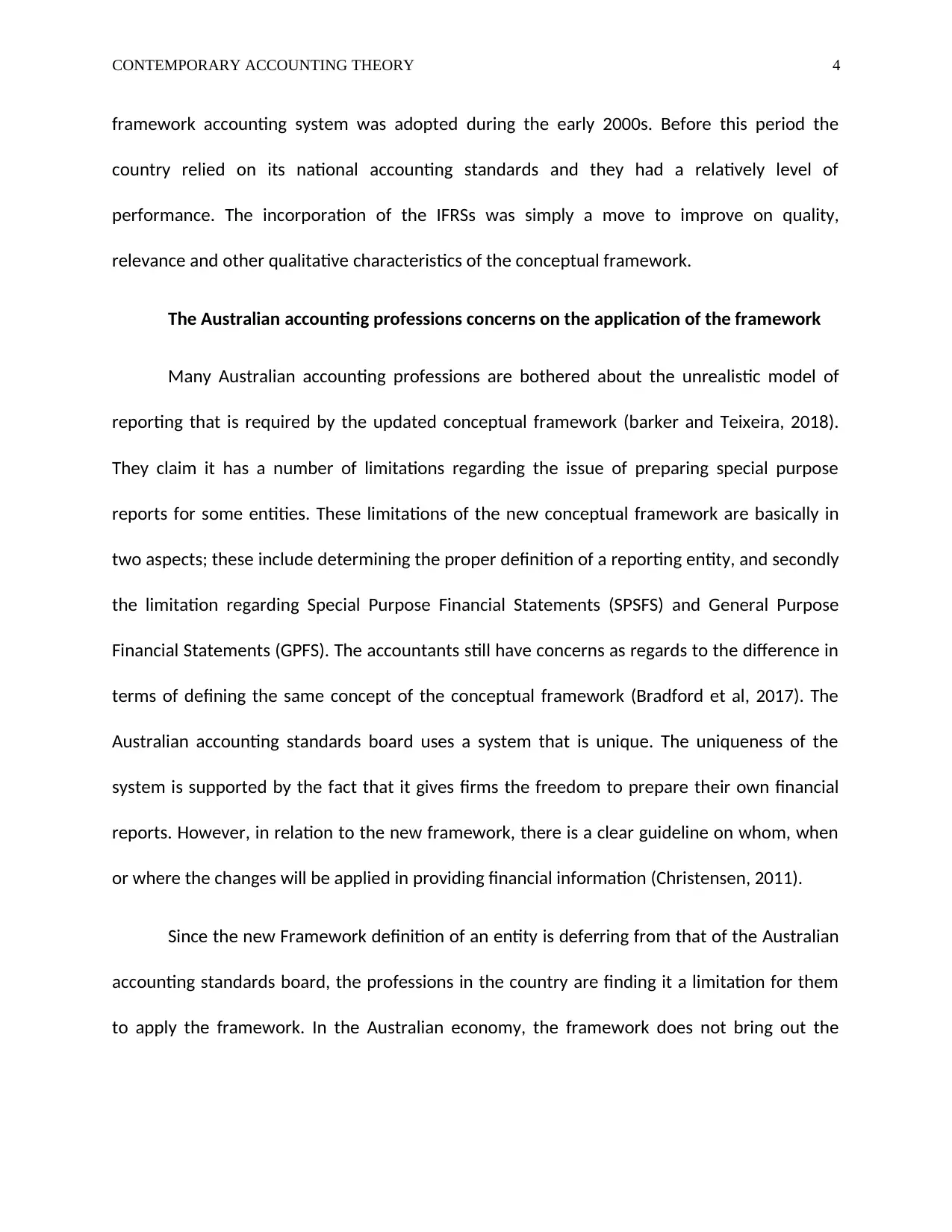
CONTEMPORARY ACCOUNTING THEORY 4
framework accounting system was adopted during the early 2000s. Before this period the
country relied on its national accounting standards and they had a relatively level of
performance. The incorporation of the IFRSs was simply a move to improve on quality,
relevance and other qualitative characteristics of the conceptual framework.
The Australian accounting professions concerns on the application of the framework
Many Australian accounting professions are bothered about the unrealistic model of
reporting that is required by the updated conceptual framework (barker and Teixeira, 2018).
They claim it has a number of limitations regarding the issue of preparing special purpose
reports for some entities. These limitations of the new conceptual framework are basically in
two aspects; these include determining the proper definition of a reporting entity, and secondly
the limitation regarding Special Purpose Financial Statements (SPSFS) and General Purpose
Financial Statements (GPFS). The accountants still have concerns as regards to the difference in
terms of defining the same concept of the conceptual framework (Bradford et al, 2017). The
Australian accounting standards board uses a system that is unique. The uniqueness of the
system is supported by the fact that it gives firms the freedom to prepare their own financial
reports. However, in relation to the new framework, there is a clear guideline on whom, when
or where the changes will be applied in providing financial information (Christensen, 2011).
Since the new Framework definition of an entity is deferring from that of the Australian
accounting standards board, the professions in the country are finding it a limitation for them
to apply the framework. In the Australian economy, the framework does not bring out the
framework accounting system was adopted during the early 2000s. Before this period the
country relied on its national accounting standards and they had a relatively level of
performance. The incorporation of the IFRSs was simply a move to improve on quality,
relevance and other qualitative characteristics of the conceptual framework.
The Australian accounting professions concerns on the application of the framework
Many Australian accounting professions are bothered about the unrealistic model of
reporting that is required by the updated conceptual framework (barker and Teixeira, 2018).
They claim it has a number of limitations regarding the issue of preparing special purpose
reports for some entities. These limitations of the new conceptual framework are basically in
two aspects; these include determining the proper definition of a reporting entity, and secondly
the limitation regarding Special Purpose Financial Statements (SPSFS) and General Purpose
Financial Statements (GPFS). The accountants still have concerns as regards to the difference in
terms of defining the same concept of the conceptual framework (Bradford et al, 2017). The
Australian accounting standards board uses a system that is unique. The uniqueness of the
system is supported by the fact that it gives firms the freedom to prepare their own financial
reports. However, in relation to the new framework, there is a clear guideline on whom, when
or where the changes will be applied in providing financial information (Christensen, 2011).
Since the new Framework definition of an entity is deferring from that of the Australian
accounting standards board, the professions in the country are finding it a limitation for them
to apply the framework. In the Australian economy, the framework does not bring out the
Secure Best Marks with AI Grader
Need help grading? Try our AI Grader for instant feedback on your assignments.
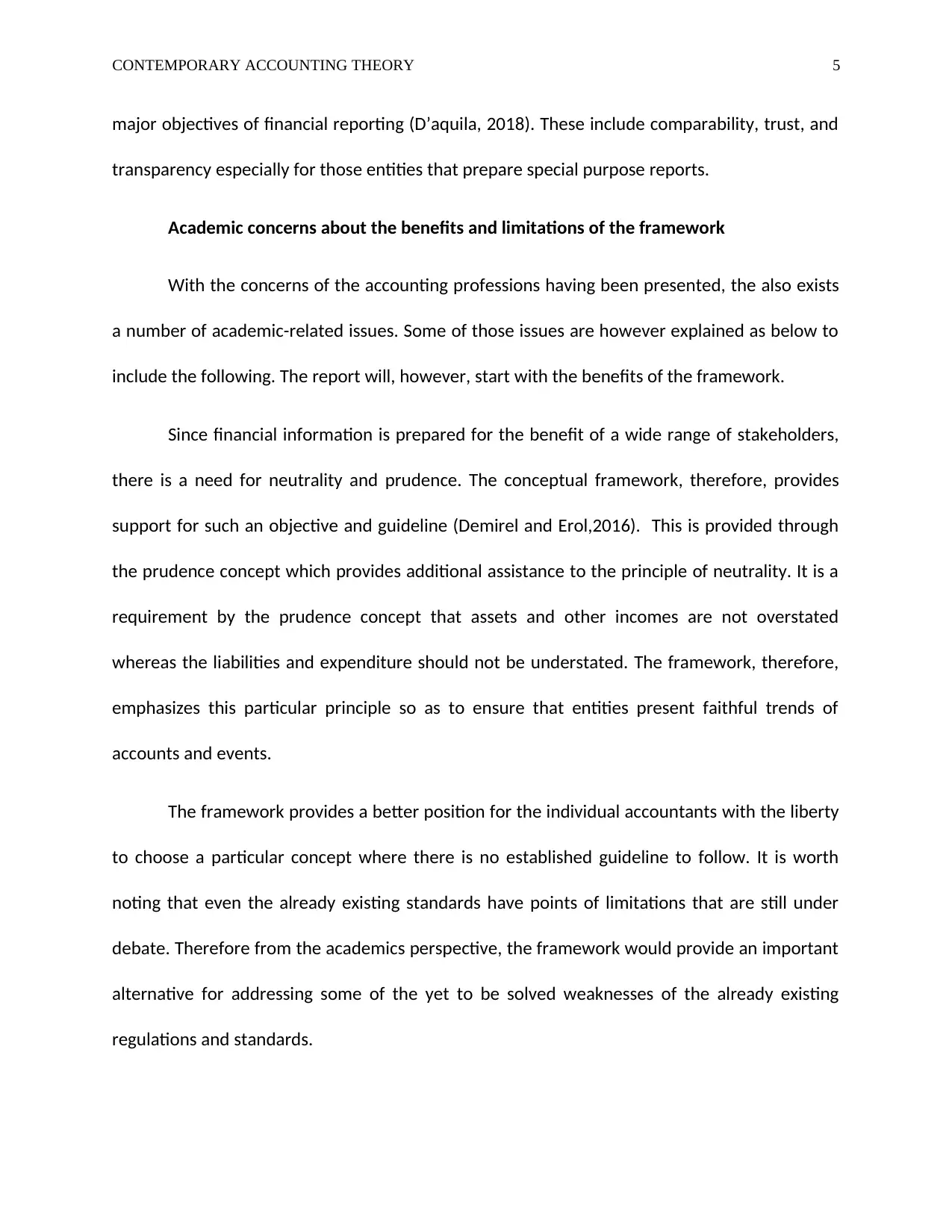
CONTEMPORARY ACCOUNTING THEORY 5
major objectives of financial reporting (D’aquila, 2018). These include comparability, trust, and
transparency especially for those entities that prepare special purpose reports.
Academic concerns about the benefits and limitations of the framework
With the concerns of the accounting professions having been presented, the also exists
a number of academic-related issues. Some of those issues are however explained as below to
include the following. The report will, however, start with the benefits of the framework.
Since financial information is prepared for the benefit of a wide range of stakeholders,
there is a need for neutrality and prudence. The conceptual framework, therefore, provides
support for such an objective and guideline (Demirel and Erol,2016). This is provided through
the prudence concept which provides additional assistance to the principle of neutrality. It is a
requirement by the prudence concept that assets and other incomes are not overstated
whereas the liabilities and expenditure should not be understated. The framework, therefore,
emphasizes this particular principle so as to ensure that entities present faithful trends of
accounts and events.
The framework provides a better position for the individual accountants with the liberty
to choose a particular concept where there is no established guideline to follow. It is worth
noting that even the already existing standards have points of limitations that are still under
debate. Therefore from the academics perspective, the framework would provide an important
alternative for addressing some of the yet to be solved weaknesses of the already existing
regulations and standards.
major objectives of financial reporting (D’aquila, 2018). These include comparability, trust, and
transparency especially for those entities that prepare special purpose reports.
Academic concerns about the benefits and limitations of the framework
With the concerns of the accounting professions having been presented, the also exists
a number of academic-related issues. Some of those issues are however explained as below to
include the following. The report will, however, start with the benefits of the framework.
Since financial information is prepared for the benefit of a wide range of stakeholders,
there is a need for neutrality and prudence. The conceptual framework, therefore, provides
support for such an objective and guideline (Demirel and Erol,2016). This is provided through
the prudence concept which provides additional assistance to the principle of neutrality. It is a
requirement by the prudence concept that assets and other incomes are not overstated
whereas the liabilities and expenditure should not be understated. The framework, therefore,
emphasizes this particular principle so as to ensure that entities present faithful trends of
accounts and events.
The framework provides a better position for the individual accountants with the liberty
to choose a particular concept where there is no established guideline to follow. It is worth
noting that even the already existing standards have points of limitations that are still under
debate. Therefore from the academics perspective, the framework would provide an important
alternative for addressing some of the yet to be solved weaknesses of the already existing
regulations and standards.
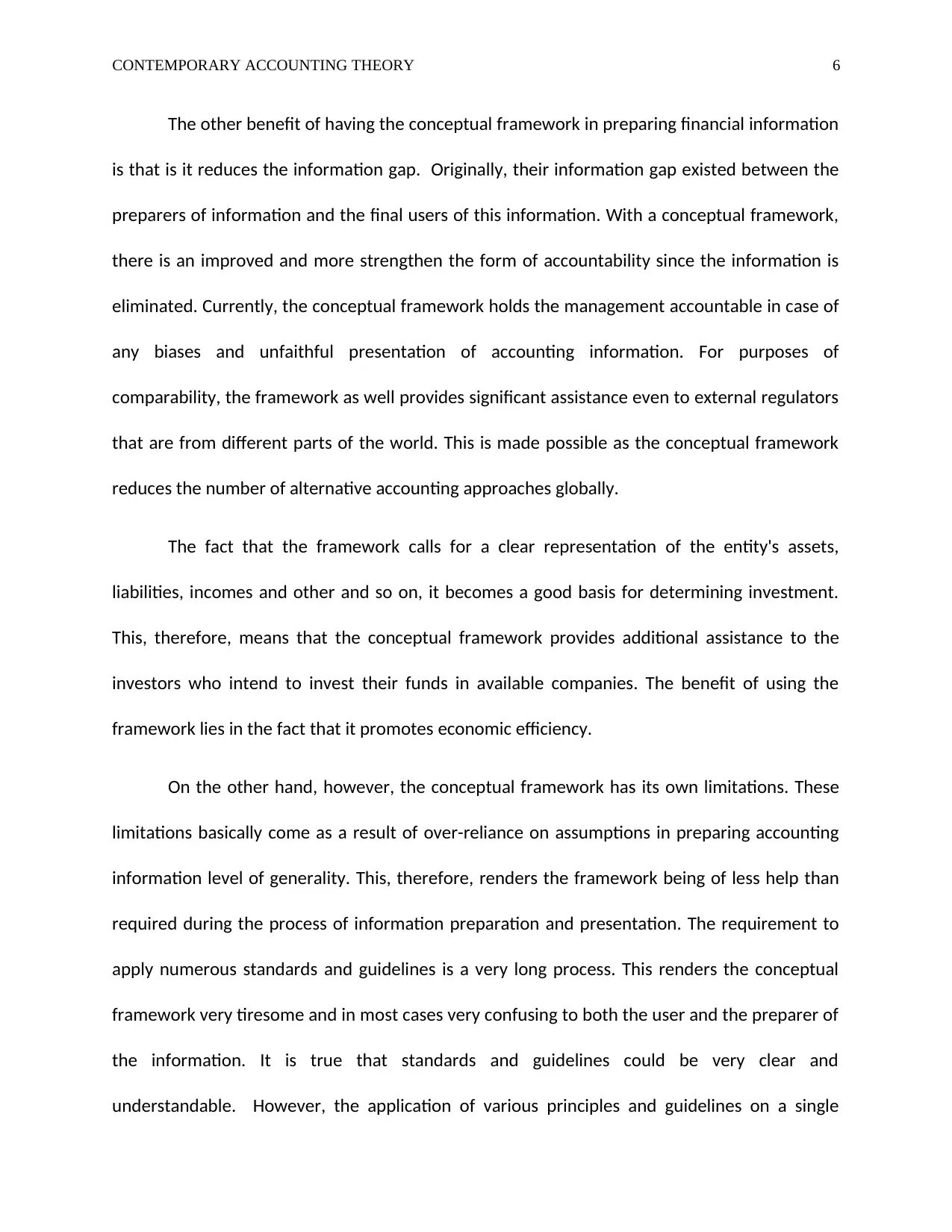
CONTEMPORARY ACCOUNTING THEORY 6
The other benefit of having the conceptual framework in preparing financial information
is that is it reduces the information gap. Originally, their information gap existed between the
preparers of information and the final users of this information. With a conceptual framework,
there is an improved and more strengthen the form of accountability since the information is
eliminated. Currently, the conceptual framework holds the management accountable in case of
any biases and unfaithful presentation of accounting information. For purposes of
comparability, the framework as well provides significant assistance even to external regulators
that are from different parts of the world. This is made possible as the conceptual framework
reduces the number of alternative accounting approaches globally.
The fact that the framework calls for a clear representation of the entity's assets,
liabilities, incomes and other and so on, it becomes a good basis for determining investment.
This, therefore, means that the conceptual framework provides additional assistance to the
investors who intend to invest their funds in available companies. The benefit of using the
framework lies in the fact that it promotes economic efficiency.
On the other hand, however, the conceptual framework has its own limitations. These
limitations basically come as a result of over-reliance on assumptions in preparing accounting
information level of generality. This, therefore, renders the framework being of less help than
required during the process of information preparation and presentation. The requirement to
apply numerous standards and guidelines is a very long process. This renders the conceptual
framework very tiresome and in most cases very confusing to both the user and the preparer of
the information. It is true that standards and guidelines could be very clear and
understandable. However, the application of various principles and guidelines on a single
The other benefit of having the conceptual framework in preparing financial information
is that is it reduces the information gap. Originally, their information gap existed between the
preparers of information and the final users of this information. With a conceptual framework,
there is an improved and more strengthen the form of accountability since the information is
eliminated. Currently, the conceptual framework holds the management accountable in case of
any biases and unfaithful presentation of accounting information. For purposes of
comparability, the framework as well provides significant assistance even to external regulators
that are from different parts of the world. This is made possible as the conceptual framework
reduces the number of alternative accounting approaches globally.
The fact that the framework calls for a clear representation of the entity's assets,
liabilities, incomes and other and so on, it becomes a good basis for determining investment.
This, therefore, means that the conceptual framework provides additional assistance to the
investors who intend to invest their funds in available companies. The benefit of using the
framework lies in the fact that it promotes economic efficiency.
On the other hand, however, the conceptual framework has its own limitations. These
limitations basically come as a result of over-reliance on assumptions in preparing accounting
information level of generality. This, therefore, renders the framework being of less help than
required during the process of information preparation and presentation. The requirement to
apply numerous standards and guidelines is a very long process. This renders the conceptual
framework very tiresome and in most cases very confusing to both the user and the preparer of
the information. It is true that standards and guidelines could be very clear and
understandable. However, the application of various principles and guidelines on a single
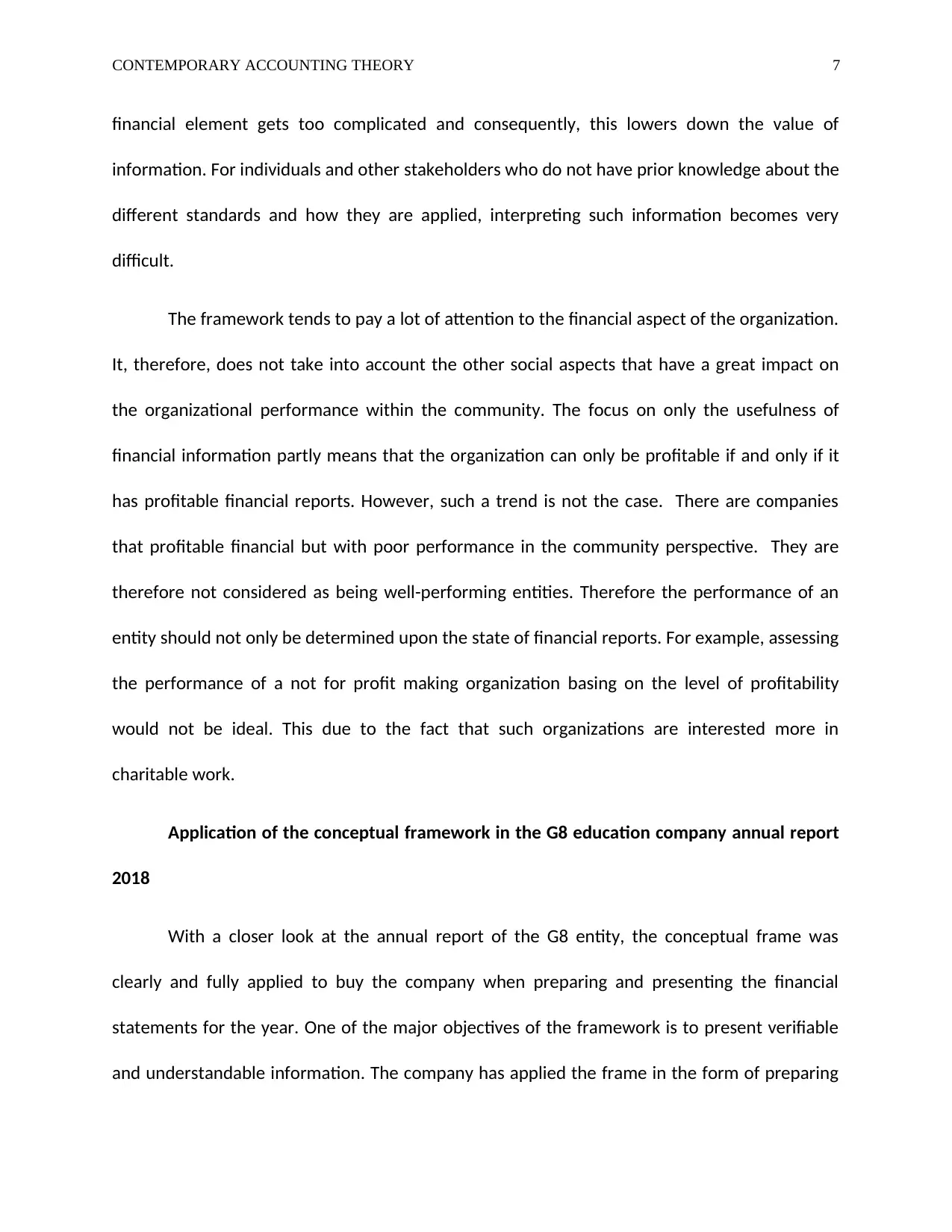
CONTEMPORARY ACCOUNTING THEORY 7
financial element gets too complicated and consequently, this lowers down the value of
information. For individuals and other stakeholders who do not have prior knowledge about the
different standards and how they are applied, interpreting such information becomes very
difficult.
The framework tends to pay a lot of attention to the financial aspect of the organization.
It, therefore, does not take into account the other social aspects that have a great impact on
the organizational performance within the community. The focus on only the usefulness of
financial information partly means that the organization can only be profitable if and only if it
has profitable financial reports. However, such a trend is not the case. There are companies
that profitable financial but with poor performance in the community perspective. They are
therefore not considered as being well-performing entities. Therefore the performance of an
entity should not only be determined upon the state of financial reports. For example, assessing
the performance of a not for profit making organization basing on the level of profitability
would not be ideal. This due to the fact that such organizations are interested more in
charitable work.
Application of the conceptual framework in the G8 education company annual report
2018
With a closer look at the annual report of the G8 entity, the conceptual frame was
clearly and fully applied to buy the company when preparing and presenting the financial
statements for the year. One of the major objectives of the framework is to present verifiable
and understandable information. The company has applied the frame in the form of preparing
financial element gets too complicated and consequently, this lowers down the value of
information. For individuals and other stakeholders who do not have prior knowledge about the
different standards and how they are applied, interpreting such information becomes very
difficult.
The framework tends to pay a lot of attention to the financial aspect of the organization.
It, therefore, does not take into account the other social aspects that have a great impact on
the organizational performance within the community. The focus on only the usefulness of
financial information partly means that the organization can only be profitable if and only if it
has profitable financial reports. However, such a trend is not the case. There are companies
that profitable financial but with poor performance in the community perspective. They are
therefore not considered as being well-performing entities. Therefore the performance of an
entity should not only be determined upon the state of financial reports. For example, assessing
the performance of a not for profit making organization basing on the level of profitability
would not be ideal. This due to the fact that such organizations are interested more in
charitable work.
Application of the conceptual framework in the G8 education company annual report
2018
With a closer look at the annual report of the G8 entity, the conceptual frame was
clearly and fully applied to buy the company when preparing and presenting the financial
statements for the year. One of the major objectives of the framework is to present verifiable
and understandable information. The company has applied the frame in the form of preparing
Paraphrase This Document
Need a fresh take? Get an instant paraphrase of this document with our AI Paraphraser
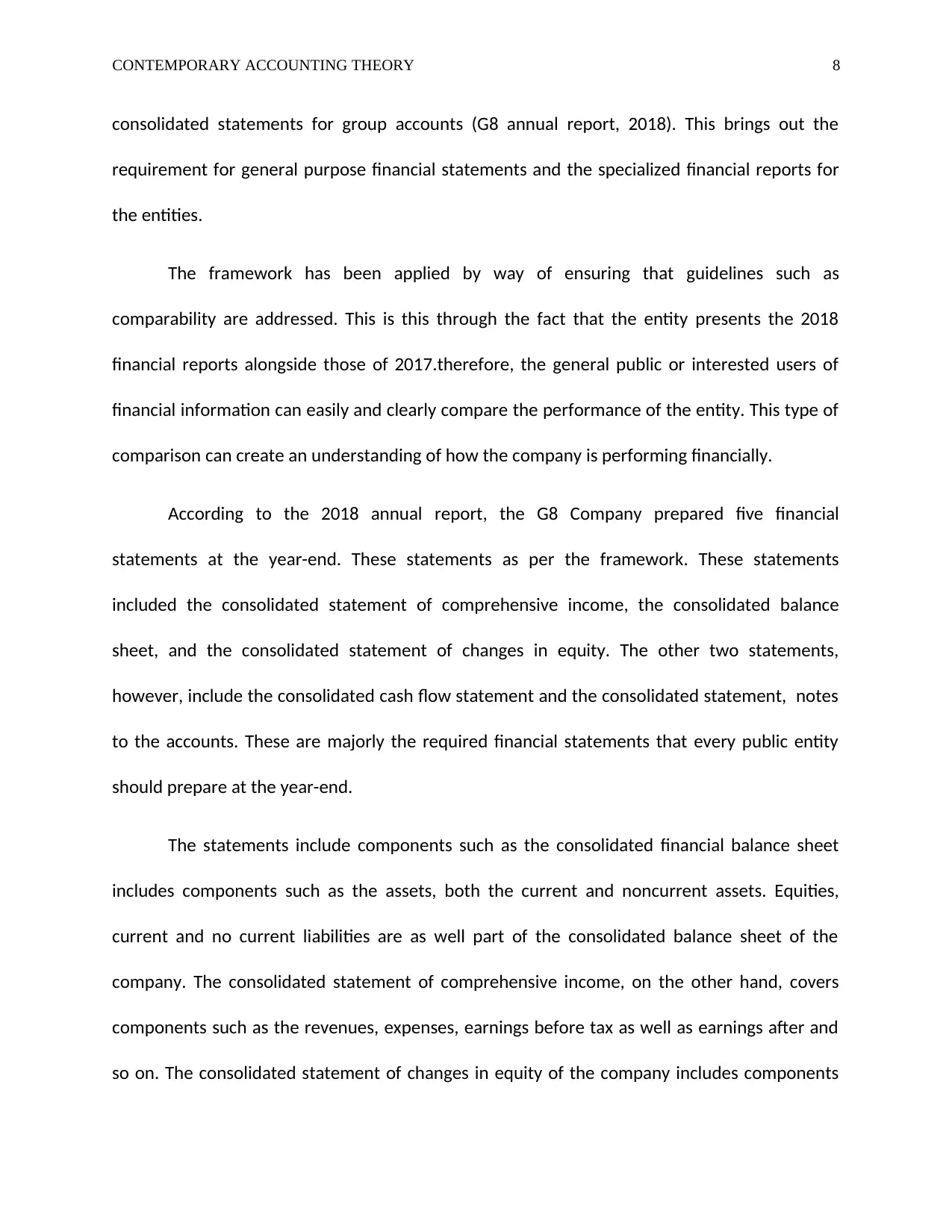
CONTEMPORARY ACCOUNTING THEORY 8
consolidated statements for group accounts (G8 annual report, 2018). This brings out the
requirement for general purpose financial statements and the specialized financial reports for
the entities.
The framework has been applied by way of ensuring that guidelines such as
comparability are addressed. This is this through the fact that the entity presents the 2018
financial reports alongside those of 2017.therefore, the general public or interested users of
financial information can easily and clearly compare the performance of the entity. This type of
comparison can create an understanding of how the company is performing financially.
According to the 2018 annual report, the G8 Company prepared five financial
statements at the year-end. These statements as per the framework. These statements
included the consolidated statement of comprehensive income, the consolidated balance
sheet, and the consolidated statement of changes in equity. The other two statements,
however, include the consolidated cash flow statement and the consolidated statement, notes
to the accounts. These are majorly the required financial statements that every public entity
should prepare at the year-end.
The statements include components such as the consolidated financial balance sheet
includes components such as the assets, both the current and noncurrent assets. Equities,
current and no current liabilities are as well part of the consolidated balance sheet of the
company. The consolidated statement of comprehensive income, on the other hand, covers
components such as the revenues, expenses, earnings before tax as well as earnings after and
so on. The consolidated statement of changes in equity of the company includes components
consolidated statements for group accounts (G8 annual report, 2018). This brings out the
requirement for general purpose financial statements and the specialized financial reports for
the entities.
The framework has been applied by way of ensuring that guidelines such as
comparability are addressed. This is this through the fact that the entity presents the 2018
financial reports alongside those of 2017.therefore, the general public or interested users of
financial information can easily and clearly compare the performance of the entity. This type of
comparison can create an understanding of how the company is performing financially.
According to the 2018 annual report, the G8 Company prepared five financial
statements at the year-end. These statements as per the framework. These statements
included the consolidated statement of comprehensive income, the consolidated balance
sheet, and the consolidated statement of changes in equity. The other two statements,
however, include the consolidated cash flow statement and the consolidated statement, notes
to the accounts. These are majorly the required financial statements that every public entity
should prepare at the year-end.
The statements include components such as the consolidated financial balance sheet
includes components such as the assets, both the current and noncurrent assets. Equities,
current and no current liabilities are as well part of the consolidated balance sheet of the
company. The consolidated statement of comprehensive income, on the other hand, covers
components such as the revenues, expenses, earnings before tax as well as earnings after and
so on. The consolidated statement of changes in equity of the company includes components
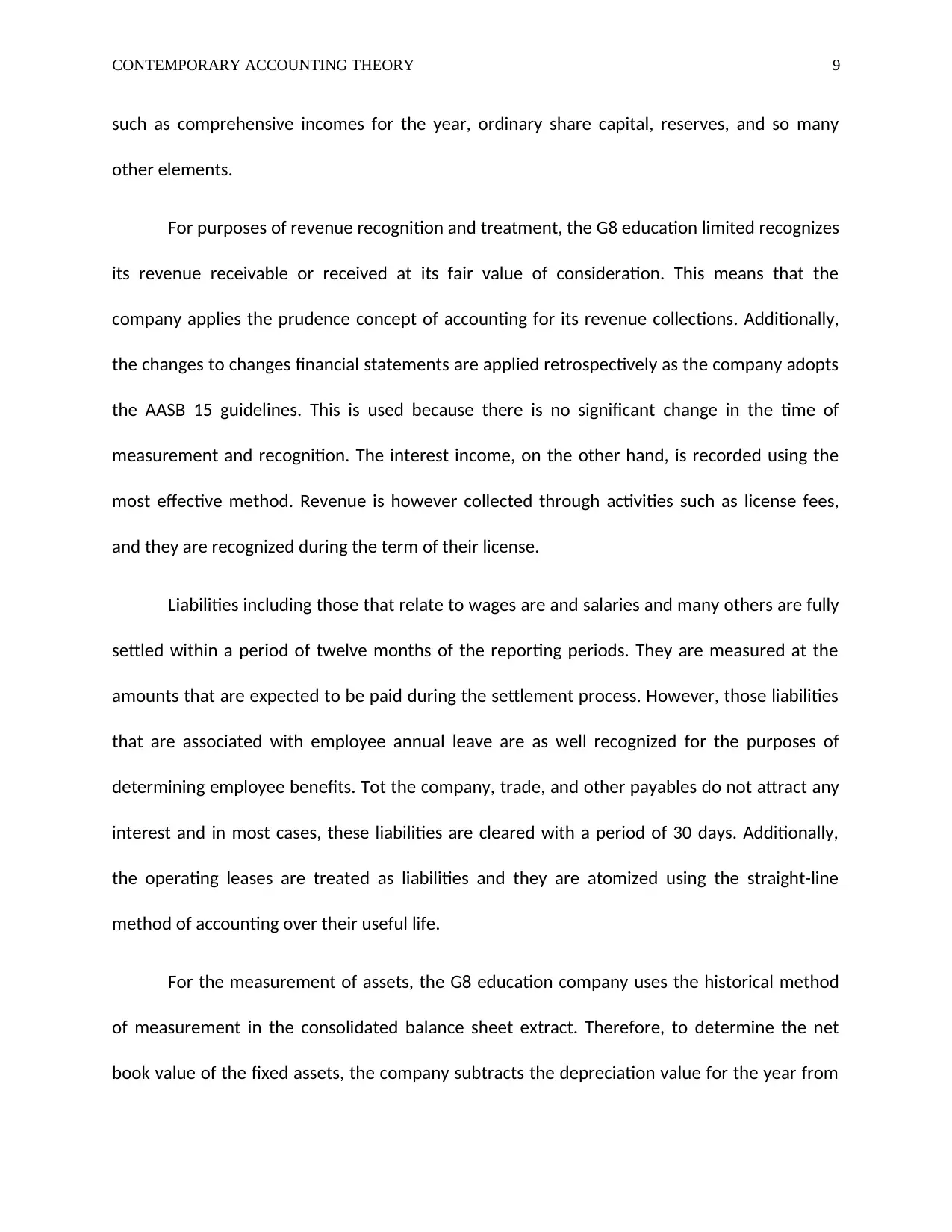
CONTEMPORARY ACCOUNTING THEORY 9
such as comprehensive incomes for the year, ordinary share capital, reserves, and so many
other elements.
For purposes of revenue recognition and treatment, the G8 education limited recognizes
its revenue receivable or received at its fair value of consideration. This means that the
company applies the prudence concept of accounting for its revenue collections. Additionally,
the changes to changes financial statements are applied retrospectively as the company adopts
the AASB 15 guidelines. This is used because there is no significant change in the time of
measurement and recognition. The interest income, on the other hand, is recorded using the
most effective method. Revenue is however collected through activities such as license fees,
and they are recognized during the term of their license.
Liabilities including those that relate to wages are and salaries and many others are fully
settled within a period of twelve months of the reporting periods. They are measured at the
amounts that are expected to be paid during the settlement process. However, those liabilities
that are associated with employee annual leave are as well recognized for the purposes of
determining employee benefits. Tot the company, trade, and other payables do not attract any
interest and in most cases, these liabilities are cleared with a period of 30 days. Additionally,
the operating leases are treated as liabilities and they are atomized using the straight-line
method of accounting over their useful life.
For the measurement of assets, the G8 education company uses the historical method
of measurement in the consolidated balance sheet extract. Therefore, to determine the net
book value of the fixed assets, the company subtracts the depreciation value for the year from
such as comprehensive incomes for the year, ordinary share capital, reserves, and so many
other elements.
For purposes of revenue recognition and treatment, the G8 education limited recognizes
its revenue receivable or received at its fair value of consideration. This means that the
company applies the prudence concept of accounting for its revenue collections. Additionally,
the changes to changes financial statements are applied retrospectively as the company adopts
the AASB 15 guidelines. This is used because there is no significant change in the time of
measurement and recognition. The interest income, on the other hand, is recorded using the
most effective method. Revenue is however collected through activities such as license fees,
and they are recognized during the term of their license.
Liabilities including those that relate to wages are and salaries and many others are fully
settled within a period of twelve months of the reporting periods. They are measured at the
amounts that are expected to be paid during the settlement process. However, those liabilities
that are associated with employee annual leave are as well recognized for the purposes of
determining employee benefits. Tot the company, trade, and other payables do not attract any
interest and in most cases, these liabilities are cleared with a period of 30 days. Additionally,
the operating leases are treated as liabilities and they are atomized using the straight-line
method of accounting over their useful life.
For the measurement of assets, the G8 education company uses the historical method
of measurement in the consolidated balance sheet extract. Therefore, to determine the net
book value of the fixed assets, the company subtracts the depreciation value for the year from
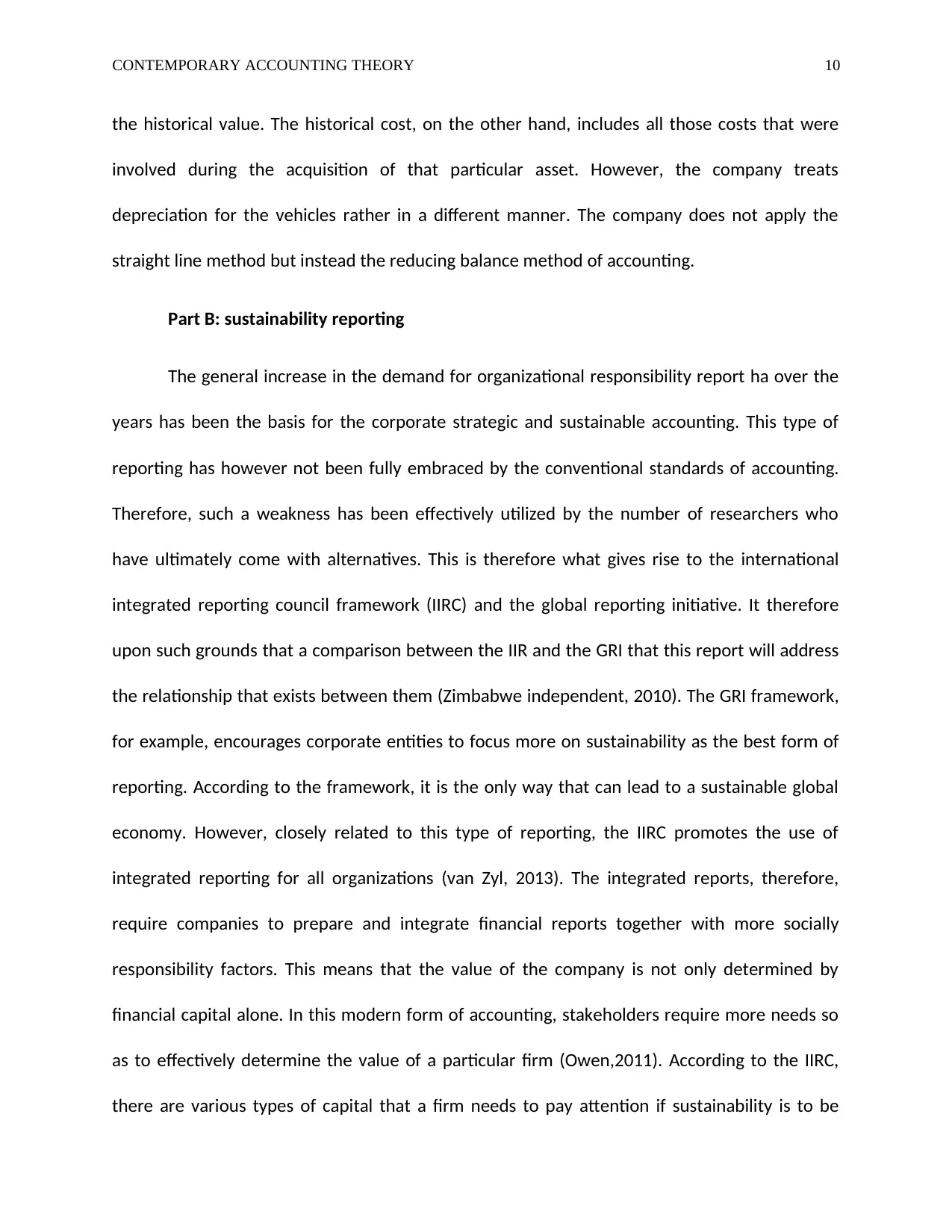
CONTEMPORARY ACCOUNTING THEORY 10
the historical value. The historical cost, on the other hand, includes all those costs that were
involved during the acquisition of that particular asset. However, the company treats
depreciation for the vehicles rather in a different manner. The company does not apply the
straight line method but instead the reducing balance method of accounting.
Part B: sustainability reporting
The general increase in the demand for organizational responsibility report ha over the
years has been the basis for the corporate strategic and sustainable accounting. This type of
reporting has however not been fully embraced by the conventional standards of accounting.
Therefore, such a weakness has been effectively utilized by the number of researchers who
have ultimately come with alternatives. This is therefore what gives rise to the international
integrated reporting council framework (IIRC) and the global reporting initiative. It therefore
upon such grounds that a comparison between the IIR and the GRI that this report will address
the relationship that exists between them (Zimbabwe independent, 2010). The GRI framework,
for example, encourages corporate entities to focus more on sustainability as the best form of
reporting. According to the framework, it is the only way that can lead to a sustainable global
economy. However, closely related to this type of reporting, the IIRC promotes the use of
integrated reporting for all organizations (van Zyl, 2013). The integrated reports, therefore,
require companies to prepare and integrate financial reports together with more socially
responsibility factors. This means that the value of the company is not only determined by
financial capital alone. In this modern form of accounting, stakeholders require more needs so
as to effectively determine the value of a particular firm (Owen,2011). According to the IIRC,
there are various types of capital that a firm needs to pay attention if sustainability is to be
the historical value. The historical cost, on the other hand, includes all those costs that were
involved during the acquisition of that particular asset. However, the company treats
depreciation for the vehicles rather in a different manner. The company does not apply the
straight line method but instead the reducing balance method of accounting.
Part B: sustainability reporting
The general increase in the demand for organizational responsibility report ha over the
years has been the basis for the corporate strategic and sustainable accounting. This type of
reporting has however not been fully embraced by the conventional standards of accounting.
Therefore, such a weakness has been effectively utilized by the number of researchers who
have ultimately come with alternatives. This is therefore what gives rise to the international
integrated reporting council framework (IIRC) and the global reporting initiative. It therefore
upon such grounds that a comparison between the IIR and the GRI that this report will address
the relationship that exists between them (Zimbabwe independent, 2010). The GRI framework,
for example, encourages corporate entities to focus more on sustainability as the best form of
reporting. According to the framework, it is the only way that can lead to a sustainable global
economy. However, closely related to this type of reporting, the IIRC promotes the use of
integrated reporting for all organizations (van Zyl, 2013). The integrated reports, therefore,
require companies to prepare and integrate financial reports together with more socially
responsibility factors. This means that the value of the company is not only determined by
financial capital alone. In this modern form of accounting, stakeholders require more needs so
as to effectively determine the value of a particular firm (Owen,2011). According to the IIRC,
there are various types of capital that a firm needs to pay attention if sustainability is to be
Secure Best Marks with AI Grader
Need help grading? Try our AI Grader for instant feedback on your assignments.
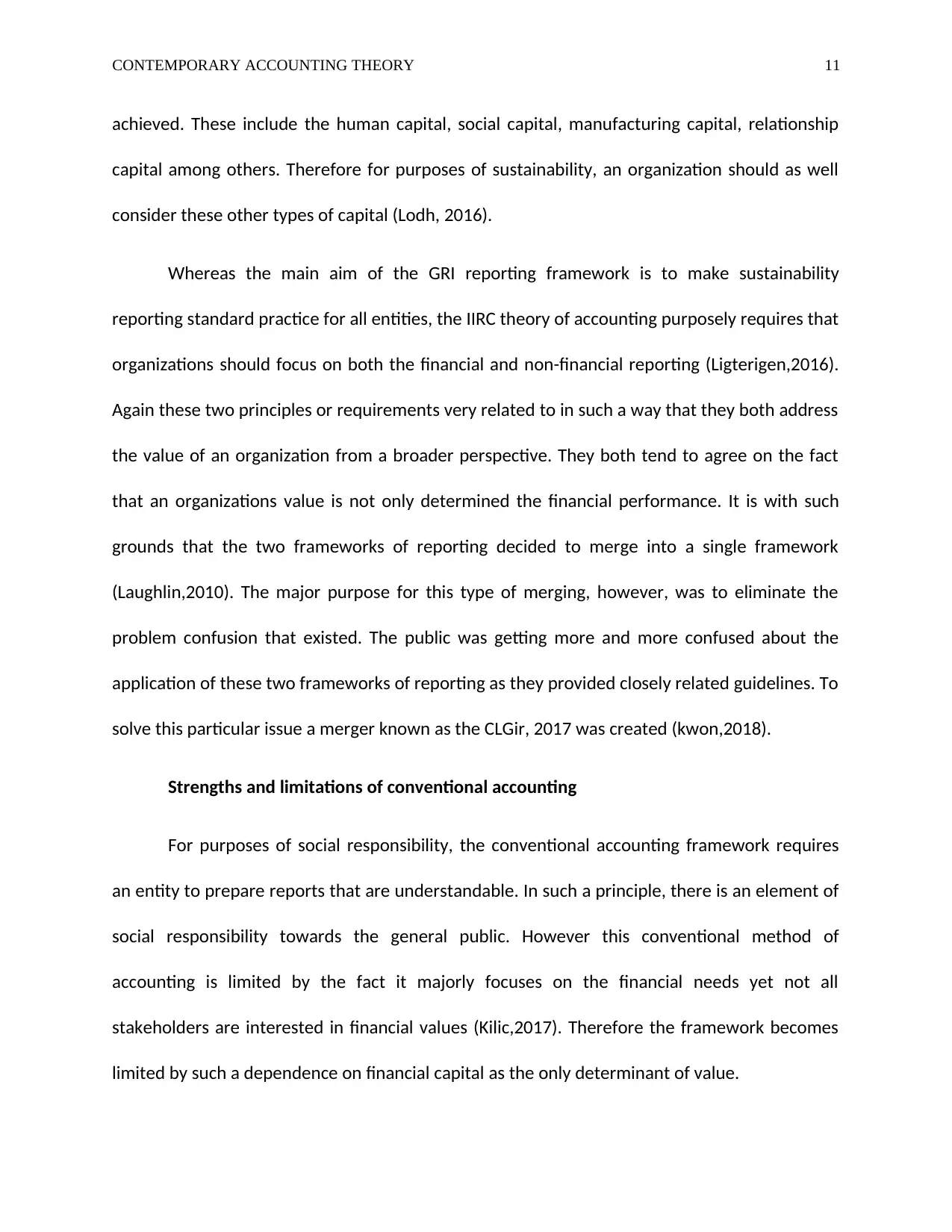
CONTEMPORARY ACCOUNTING THEORY 11
achieved. These include the human capital, social capital, manufacturing capital, relationship
capital among others. Therefore for purposes of sustainability, an organization should as well
consider these other types of capital (Lodh, 2016).
Whereas the main aim of the GRI reporting framework is to make sustainability
reporting standard practice for all entities, the IIRC theory of accounting purposely requires that
organizations should focus on both the financial and non-financial reporting (Ligterigen,2016).
Again these two principles or requirements very related to in such a way that they both address
the value of an organization from a broader perspective. They both tend to agree on the fact
that an organizations value is not only determined the financial performance. It is with such
grounds that the two frameworks of reporting decided to merge into a single framework
(Laughlin,2010). The major purpose for this type of merging, however, was to eliminate the
problem confusion that existed. The public was getting more and more confused about the
application of these two frameworks of reporting as they provided closely related guidelines. To
solve this particular issue a merger known as the CLGir, 2017 was created (kwon,2018).
Strengths and limitations of conventional accounting
For purposes of social responsibility, the conventional accounting framework requires
an entity to prepare reports that are understandable. In such a principle, there is an element of
social responsibility towards the general public. However this conventional method of
accounting is limited by the fact it majorly focuses on the financial needs yet not all
stakeholders are interested in financial values (Kilic,2017). Therefore the framework becomes
limited by such a dependence on financial capital as the only determinant of value.
achieved. These include the human capital, social capital, manufacturing capital, relationship
capital among others. Therefore for purposes of sustainability, an organization should as well
consider these other types of capital (Lodh, 2016).
Whereas the main aim of the GRI reporting framework is to make sustainability
reporting standard practice for all entities, the IIRC theory of accounting purposely requires that
organizations should focus on both the financial and non-financial reporting (Ligterigen,2016).
Again these two principles or requirements very related to in such a way that they both address
the value of an organization from a broader perspective. They both tend to agree on the fact
that an organizations value is not only determined the financial performance. It is with such
grounds that the two frameworks of reporting decided to merge into a single framework
(Laughlin,2010). The major purpose for this type of merging, however, was to eliminate the
problem confusion that existed. The public was getting more and more confused about the
application of these two frameworks of reporting as they provided closely related guidelines. To
solve this particular issue a merger known as the CLGir, 2017 was created (kwon,2018).
Strengths and limitations of conventional accounting
For purposes of social responsibility, the conventional accounting framework requires
an entity to prepare reports that are understandable. In such a principle, there is an element of
social responsibility towards the general public. However this conventional method of
accounting is limited by the fact it majorly focuses on the financial needs yet not all
stakeholders are interested in financial values (Kilic,2017). Therefore the framework becomes
limited by such a dependence on financial capital as the only determinant of value.
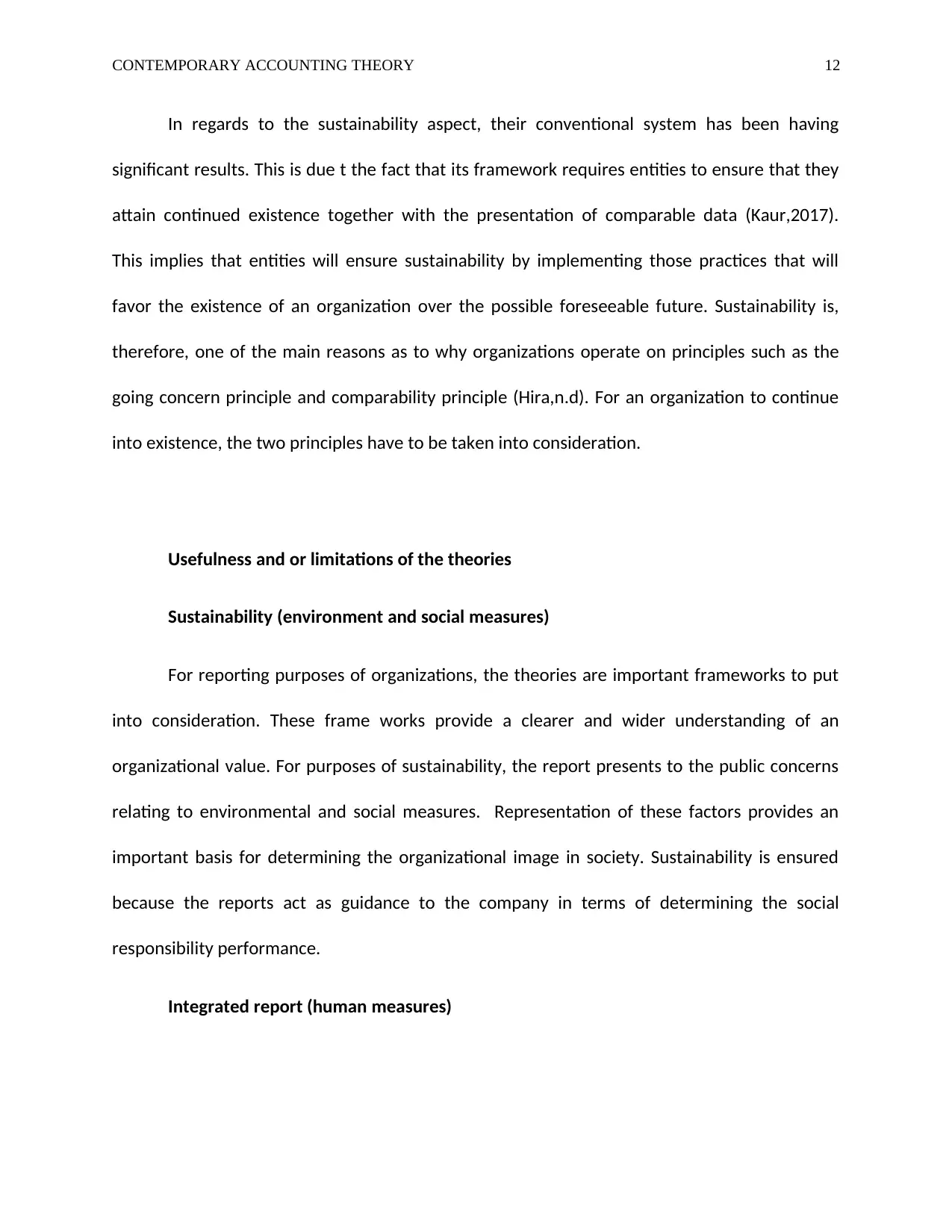
CONTEMPORARY ACCOUNTING THEORY 12
In regards to the sustainability aspect, their conventional system has been having
significant results. This is due t the fact that its framework requires entities to ensure that they
attain continued existence together with the presentation of comparable data (Kaur,2017).
This implies that entities will ensure sustainability by implementing those practices that will
favor the existence of an organization over the possible foreseeable future. Sustainability is,
therefore, one of the main reasons as to why organizations operate on principles such as the
going concern principle and comparability principle (Hira,n.d). For an organization to continue
into existence, the two principles have to be taken into consideration.
Usefulness and or limitations of the theories
Sustainability (environment and social measures)
For reporting purposes of organizations, the theories are important frameworks to put
into consideration. These frame works provide a clearer and wider understanding of an
organizational value. For purposes of sustainability, the report presents to the public concerns
relating to environmental and social measures. Representation of these factors provides an
important basis for determining the organizational image in society. Sustainability is ensured
because the reports act as guidance to the company in terms of determining the social
responsibility performance.
Integrated report (human measures)
In regards to the sustainability aspect, their conventional system has been having
significant results. This is due t the fact that its framework requires entities to ensure that they
attain continued existence together with the presentation of comparable data (Kaur,2017).
This implies that entities will ensure sustainability by implementing those practices that will
favor the existence of an organization over the possible foreseeable future. Sustainability is,
therefore, one of the main reasons as to why organizations operate on principles such as the
going concern principle and comparability principle (Hira,n.d). For an organization to continue
into existence, the two principles have to be taken into consideration.
Usefulness and or limitations of the theories
Sustainability (environment and social measures)
For reporting purposes of organizations, the theories are important frameworks to put
into consideration. These frame works provide a clearer and wider understanding of an
organizational value. For purposes of sustainability, the report presents to the public concerns
relating to environmental and social measures. Representation of these factors provides an
important basis for determining the organizational image in society. Sustainability is ensured
because the reports act as guidance to the company in terms of determining the social
responsibility performance.
Integrated report (human measures)
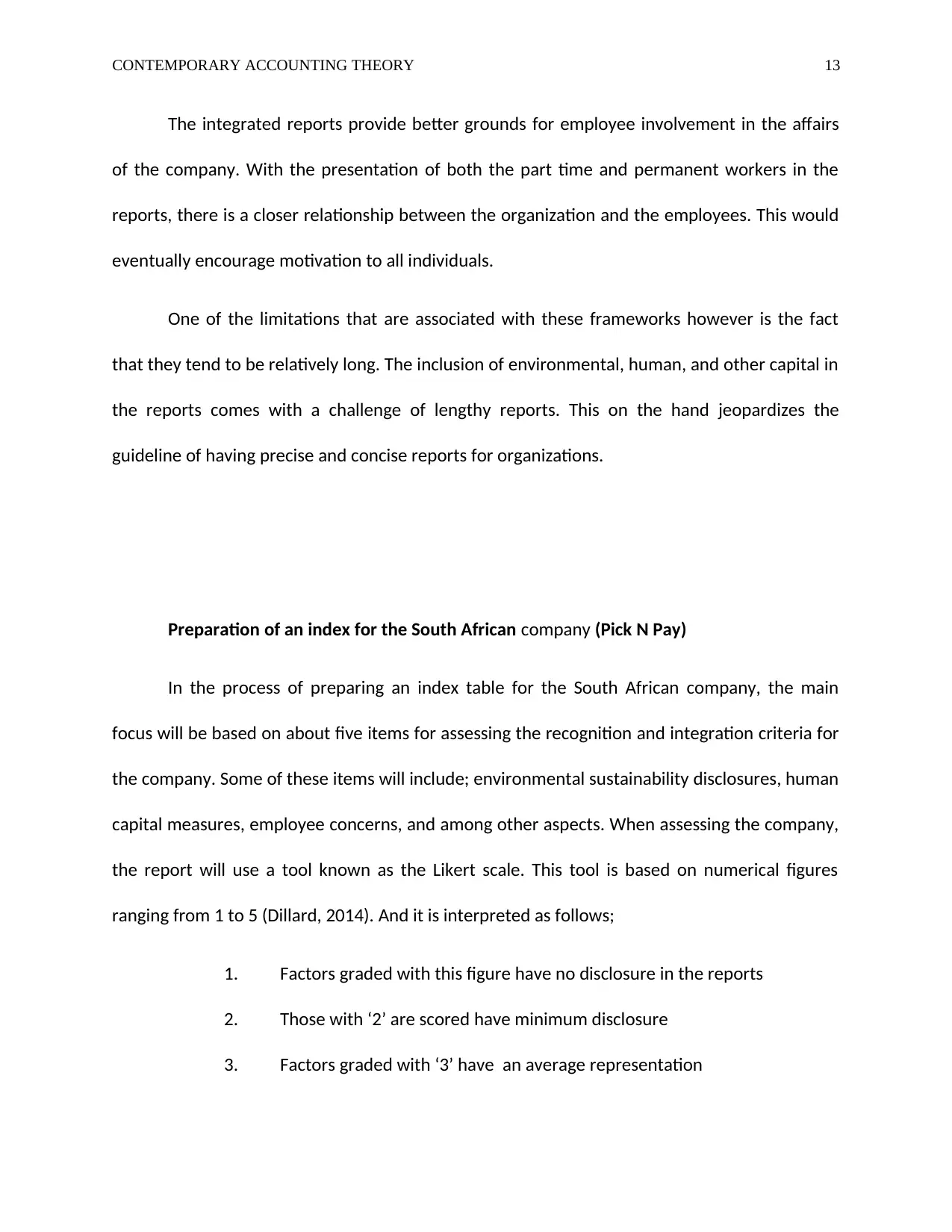
CONTEMPORARY ACCOUNTING THEORY 13
The integrated reports provide better grounds for employee involvement in the affairs
of the company. With the presentation of both the part time and permanent workers in the
reports, there is a closer relationship between the organization and the employees. This would
eventually encourage motivation to all individuals.
One of the limitations that are associated with these frameworks however is the fact
that they tend to be relatively long. The inclusion of environmental, human, and other capital in
the reports comes with a challenge of lengthy reports. This on the hand jeopardizes the
guideline of having precise and concise reports for organizations.
Preparation of an index for the South African company (Pick N Pay)
In the process of preparing an index table for the South African company, the main
focus will be based on about five items for assessing the recognition and integration criteria for
the company. Some of these items will include; environmental sustainability disclosures, human
capital measures, employee concerns, and among other aspects. When assessing the company,
the report will use a tool known as the Likert scale. This tool is based on numerical figures
ranging from 1 to 5 (Dillard, 2014). And it is interpreted as follows;
1. Factors graded with this figure have no disclosure in the reports
2. Those with ‘2’ are scored have minimum disclosure
3. Factors graded with ‘3’ have an average representation
The integrated reports provide better grounds for employee involvement in the affairs
of the company. With the presentation of both the part time and permanent workers in the
reports, there is a closer relationship between the organization and the employees. This would
eventually encourage motivation to all individuals.
One of the limitations that are associated with these frameworks however is the fact
that they tend to be relatively long. The inclusion of environmental, human, and other capital in
the reports comes with a challenge of lengthy reports. This on the hand jeopardizes the
guideline of having precise and concise reports for organizations.
Preparation of an index for the South African company (Pick N Pay)
In the process of preparing an index table for the South African company, the main
focus will be based on about five items for assessing the recognition and integration criteria for
the company. Some of these items will include; environmental sustainability disclosures, human
capital measures, employee concerns, and among other aspects. When assessing the company,
the report will use a tool known as the Likert scale. This tool is based on numerical figures
ranging from 1 to 5 (Dillard, 2014). And it is interpreted as follows;
1. Factors graded with this figure have no disclosure in the reports
2. Those with ‘2’ are scored have minimum disclosure
3. Factors graded with ‘3’ have an average representation
Paraphrase This Document
Need a fresh take? Get an instant paraphrase of this document with our AI Paraphraser
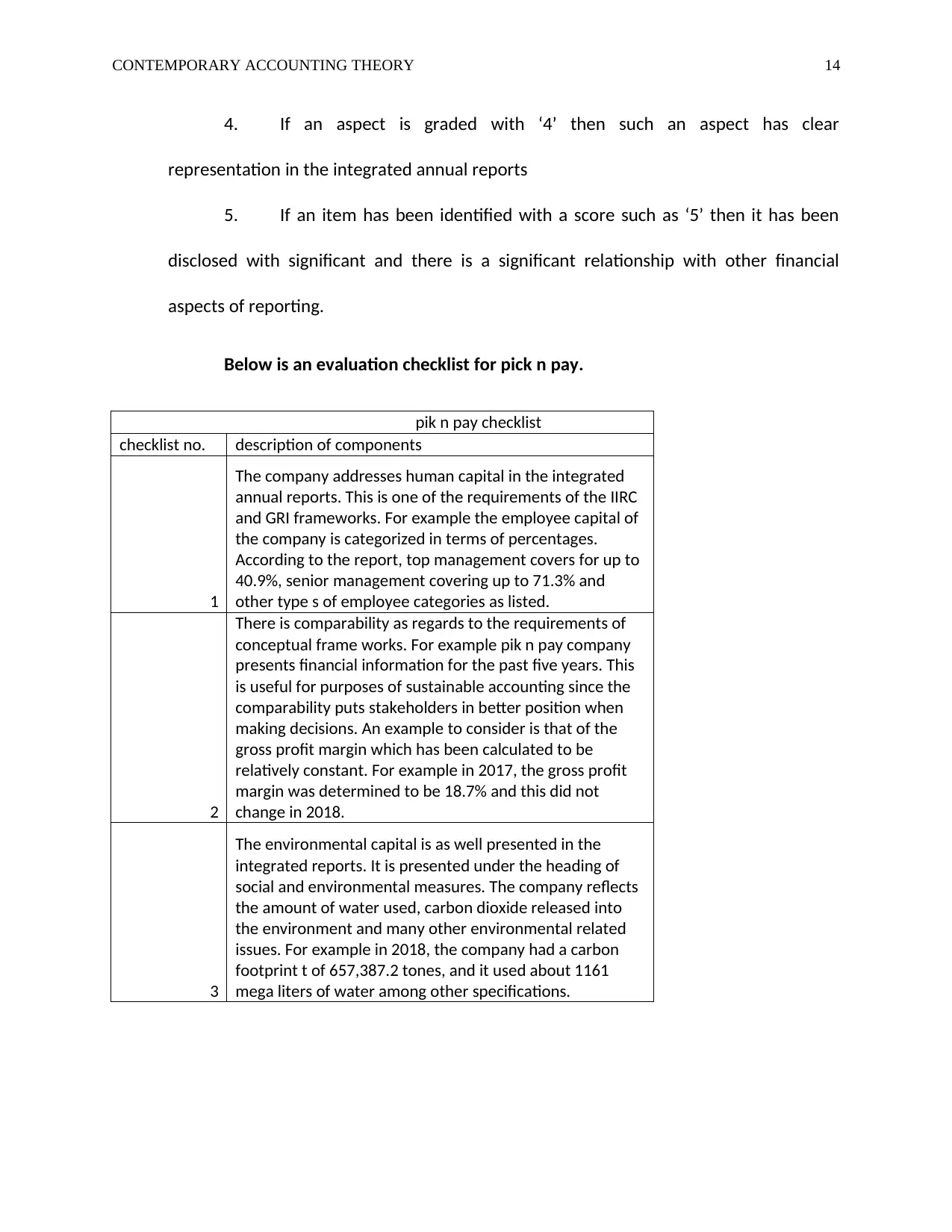
CONTEMPORARY ACCOUNTING THEORY 14
4. If an aspect is graded with ‘4’ then such an aspect has clear
representation in the integrated annual reports
5. If an item has been identified with a score such as ‘5’ then it has been
disclosed with significant and there is a significant relationship with other financial
aspects of reporting.
Below is an evaluation checklist for pick n pay.
pik n pay checklist
checklist no. description of components
1
The company addresses human capital in the integrated
annual reports. This is one of the requirements of the IIRC
and GRI frameworks. For example the employee capital of
the company is categorized in terms of percentages.
According to the report, top management covers for up to
40.9%, senior management covering up to 71.3% and
other type s of employee categories as listed.
2
There is comparability as regards to the requirements of
conceptual frame works. For example pik n pay company
presents financial information for the past five years. This
is useful for purposes of sustainable accounting since the
comparability puts stakeholders in better position when
making decisions. An example to consider is that of the
gross profit margin which has been calculated to be
relatively constant. For example in 2017, the gross profit
margin was determined to be 18.7% and this did not
change in 2018.
3
The environmental capital is as well presented in the
integrated reports. It is presented under the heading of
social and environmental measures. The company reflects
the amount of water used, carbon dioxide released into
the environment and many other environmental related
issues. For example in 2018, the company had a carbon
footprint t of 657,387.2 tones, and it used about 1161
mega liters of water among other specifications.
4. If an aspect is graded with ‘4’ then such an aspect has clear
representation in the integrated annual reports
5. If an item has been identified with a score such as ‘5’ then it has been
disclosed with significant and there is a significant relationship with other financial
aspects of reporting.
Below is an evaluation checklist for pick n pay.
pik n pay checklist
checklist no. description of components
1
The company addresses human capital in the integrated
annual reports. This is one of the requirements of the IIRC
and GRI frameworks. For example the employee capital of
the company is categorized in terms of percentages.
According to the report, top management covers for up to
40.9%, senior management covering up to 71.3% and
other type s of employee categories as listed.
2
There is comparability as regards to the requirements of
conceptual frame works. For example pik n pay company
presents financial information for the past five years. This
is useful for purposes of sustainable accounting since the
comparability puts stakeholders in better position when
making decisions. An example to consider is that of the
gross profit margin which has been calculated to be
relatively constant. For example in 2017, the gross profit
margin was determined to be 18.7% and this did not
change in 2018.
3
The environmental capital is as well presented in the
integrated reports. It is presented under the heading of
social and environmental measures. The company reflects
the amount of water used, carbon dioxide released into
the environment and many other environmental related
issues. For example in 2018, the company had a carbon
footprint t of 657,387.2 tones, and it used about 1161
mega liters of water among other specifications.
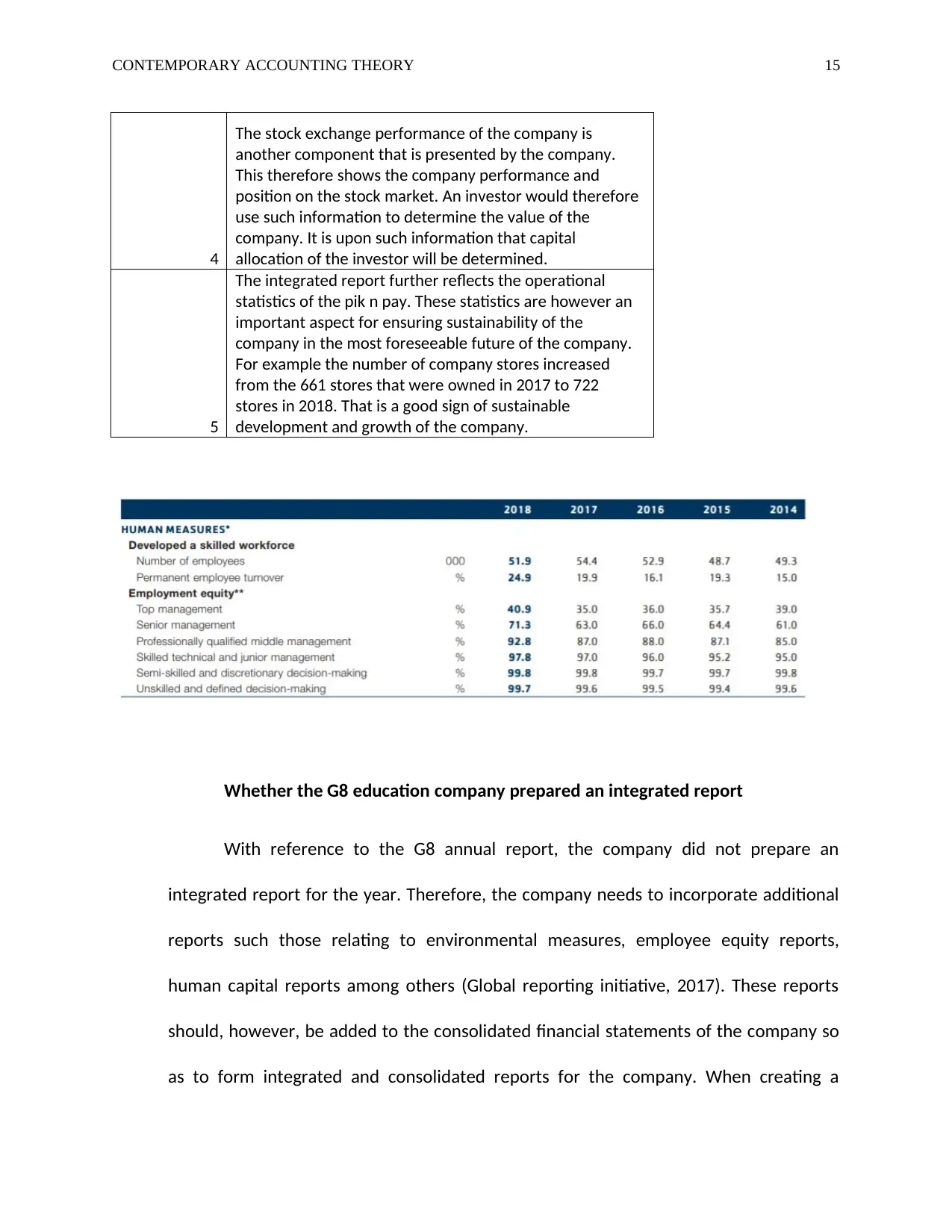
CONTEMPORARY ACCOUNTING THEORY 15
4
The stock exchange performance of the company is
another component that is presented by the company.
This therefore shows the company performance and
position on the stock market. An investor would therefore
use such information to determine the value of the
company. It is upon such information that capital
allocation of the investor will be determined.
5
The integrated report further reflects the operational
statistics of the pik n pay. These statistics are however an
important aspect for ensuring sustainability of the
company in the most foreseeable future of the company.
For example the number of company stores increased
from the 661 stores that were owned in 2017 to 722
stores in 2018. That is a good sign of sustainable
development and growth of the company.
Whether the G8 education company prepared an integrated report
With reference to the G8 annual report, the company did not prepare an
integrated report for the year. Therefore, the company needs to incorporate additional
reports such those relating to environmental measures, employee equity reports,
human capital reports among others (Global reporting initiative, 2017). These reports
should, however, be added to the consolidated financial statements of the company so
as to form integrated and consolidated reports for the company. When creating a
4
The stock exchange performance of the company is
another component that is presented by the company.
This therefore shows the company performance and
position on the stock market. An investor would therefore
use such information to determine the value of the
company. It is upon such information that capital
allocation of the investor will be determined.
5
The integrated report further reflects the operational
statistics of the pik n pay. These statistics are however an
important aspect for ensuring sustainability of the
company in the most foreseeable future of the company.
For example the number of company stores increased
from the 661 stores that were owned in 2017 to 722
stores in 2018. That is a good sign of sustainable
development and growth of the company.
Whether the G8 education company prepared an integrated report
With reference to the G8 annual report, the company did not prepare an
integrated report for the year. Therefore, the company needs to incorporate additional
reports such those relating to environmental measures, employee equity reports,
human capital reports among others (Global reporting initiative, 2017). These reports
should, however, be added to the consolidated financial statements of the company so
as to form integrated and consolidated reports for the company. When creating a
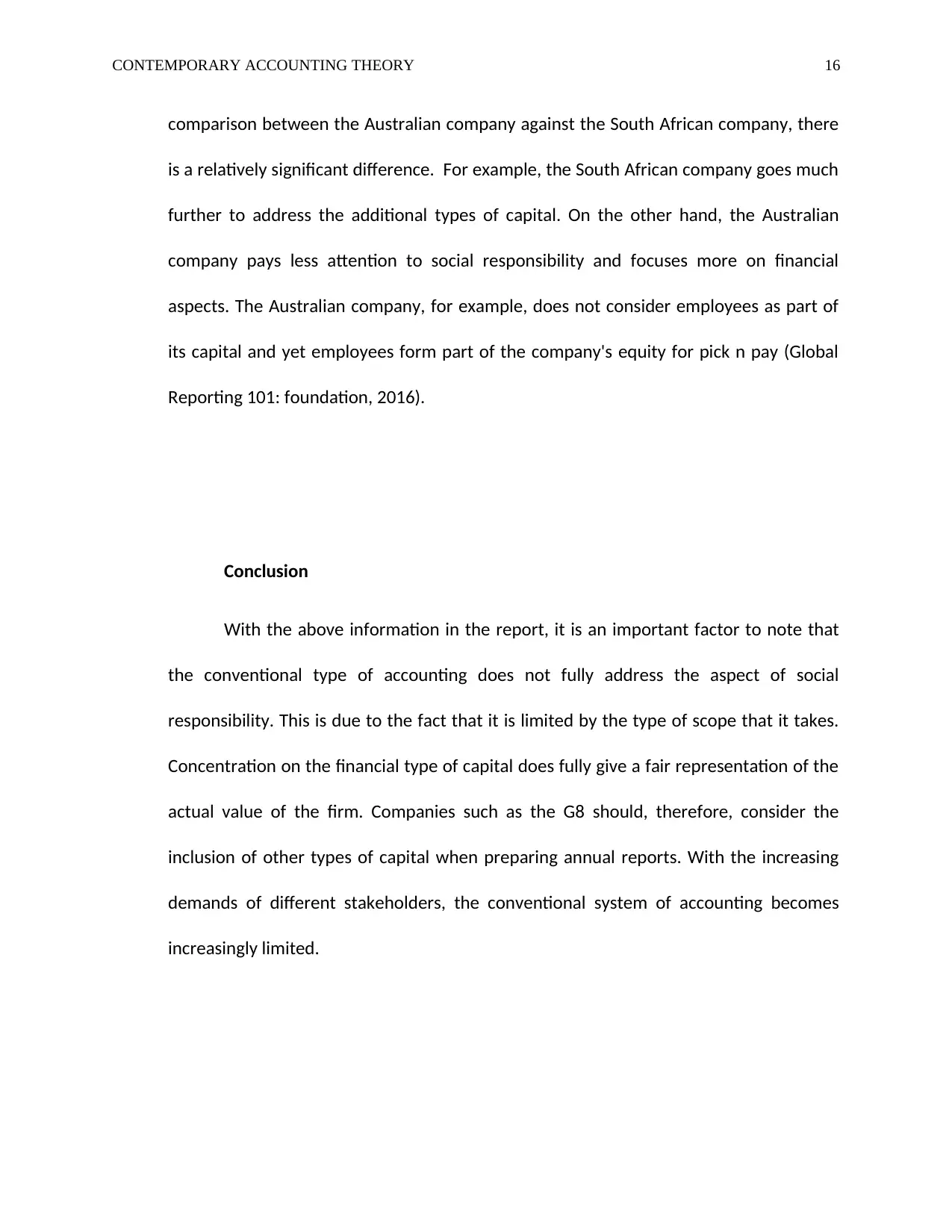
CONTEMPORARY ACCOUNTING THEORY 16
comparison between the Australian company against the South African company, there
is a relatively significant difference. For example, the South African company goes much
further to address the additional types of capital. On the other hand, the Australian
company pays less attention to social responsibility and focuses more on financial
aspects. The Australian company, for example, does not consider employees as part of
its capital and yet employees form part of the company's equity for pick n pay (Global
Reporting 101: foundation, 2016).
Conclusion
With the above information in the report, it is an important factor to note that
the conventional type of accounting does not fully address the aspect of social
responsibility. This is due to the fact that it is limited by the type of scope that it takes.
Concentration on the financial type of capital does fully give a fair representation of the
actual value of the firm. Companies such as the G8 should, therefore, consider the
inclusion of other types of capital when preparing annual reports. With the increasing
demands of different stakeholders, the conventional system of accounting becomes
increasingly limited.
comparison between the Australian company against the South African company, there
is a relatively significant difference. For example, the South African company goes much
further to address the additional types of capital. On the other hand, the Australian
company pays less attention to social responsibility and focuses more on financial
aspects. The Australian company, for example, does not consider employees as part of
its capital and yet employees form part of the company's equity for pick n pay (Global
Reporting 101: foundation, 2016).
Conclusion
With the above information in the report, it is an important factor to note that
the conventional type of accounting does not fully address the aspect of social
responsibility. This is due to the fact that it is limited by the type of scope that it takes.
Concentration on the financial type of capital does fully give a fair representation of the
actual value of the firm. Companies such as the G8 should, therefore, consider the
inclusion of other types of capital when preparing annual reports. With the increasing
demands of different stakeholders, the conventional system of accounting becomes
increasingly limited.
Secure Best Marks with AI Grader
Need help grading? Try our AI Grader for instant feedback on your assignments.
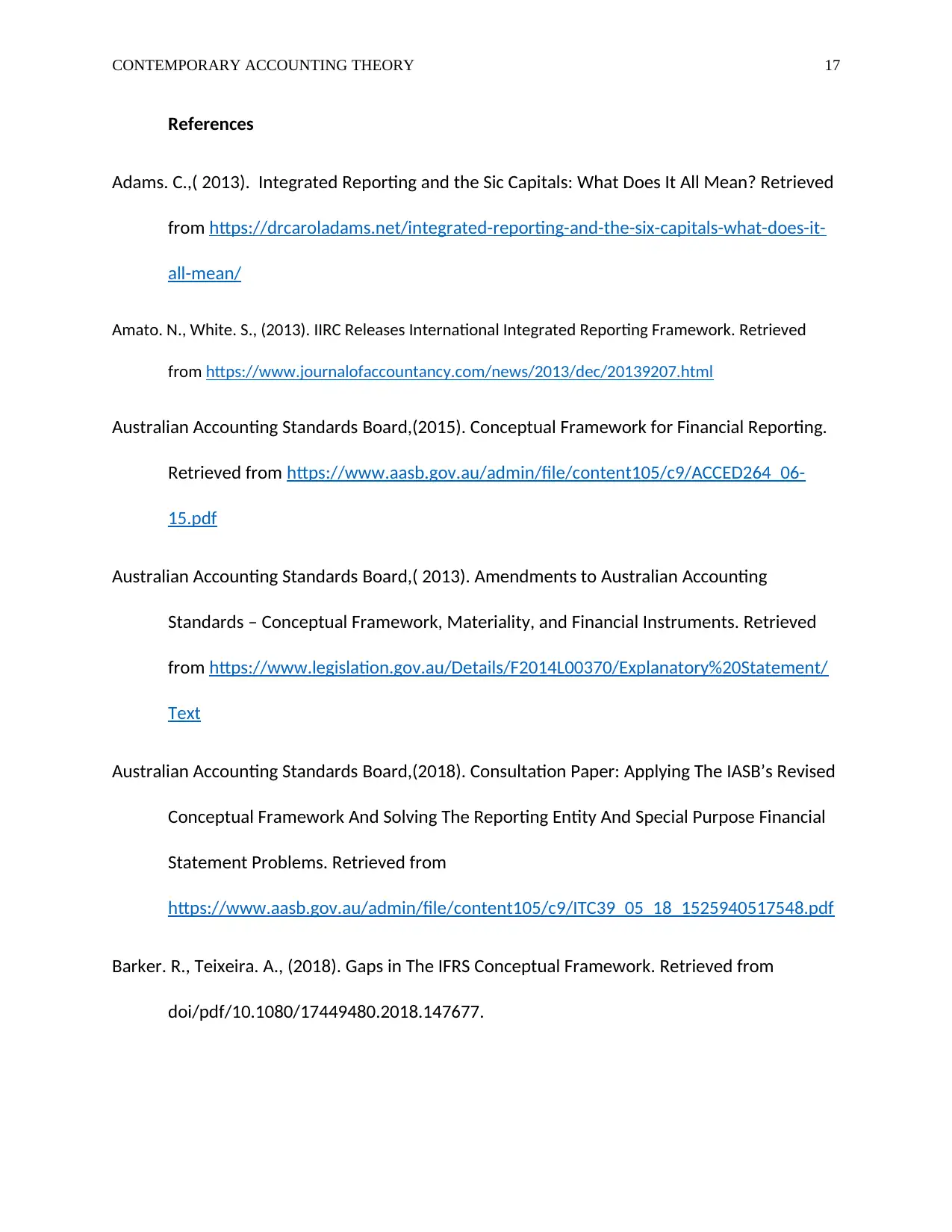
CONTEMPORARY ACCOUNTING THEORY 17
References
Adams. C.,( 2013). Integrated Reporting and the Sic Capitals: What Does It All Mean? Retrieved
from https://drcaroladams.net/integrated-reporting-and-the-six-capitals-what-does-it-
all-mean/
Amato. N., White. S., (2013). IIRC Releases International Integrated Reporting Framework. Retrieved
from https://www.journalofaccountancy.com/news/2013/dec/20139207.html
Australian Accounting Standards Board,(2015). Conceptual Framework for Financial Reporting.
Retrieved from https://www.aasb.gov.au/admin/file/content105/c9/ACCED264_06-
15.pdf
Australian Accounting Standards Board,( 2013). Amendments to Australian Accounting
Standards – Conceptual Framework, Materiality, and Financial Instruments. Retrieved
from https://www.legislation.gov.au/Details/F2014L00370/Explanatory%20Statement/
Text
Australian Accounting Standards Board,(2018). Consultation Paper: Applying The IASB’s Revised
Conceptual Framework And Solving The Reporting Entity And Special Purpose Financial
Statement Problems. Retrieved from
https://www.aasb.gov.au/admin/file/content105/c9/ITC39_05_18_1525940517548.pdf
Barker. R., Teixeira. A., (2018). Gaps in The IFRS Conceptual Framework. Retrieved from
doi/pdf/10.1080/17449480.2018.147677.
References
Adams. C.,( 2013). Integrated Reporting and the Sic Capitals: What Does It All Mean? Retrieved
from https://drcaroladams.net/integrated-reporting-and-the-six-capitals-what-does-it-
all-mean/
Amato. N., White. S., (2013). IIRC Releases International Integrated Reporting Framework. Retrieved
from https://www.journalofaccountancy.com/news/2013/dec/20139207.html
Australian Accounting Standards Board,(2015). Conceptual Framework for Financial Reporting.
Retrieved from https://www.aasb.gov.au/admin/file/content105/c9/ACCED264_06-
15.pdf
Australian Accounting Standards Board,( 2013). Amendments to Australian Accounting
Standards – Conceptual Framework, Materiality, and Financial Instruments. Retrieved
from https://www.legislation.gov.au/Details/F2014L00370/Explanatory%20Statement/
Text
Australian Accounting Standards Board,(2018). Consultation Paper: Applying The IASB’s Revised
Conceptual Framework And Solving The Reporting Entity And Special Purpose Financial
Statement Problems. Retrieved from
https://www.aasb.gov.au/admin/file/content105/c9/ITC39_05_18_1525940517548.pdf
Barker. R., Teixeira. A., (2018). Gaps in The IFRS Conceptual Framework. Retrieved from
doi/pdf/10.1080/17449480.2018.147677.
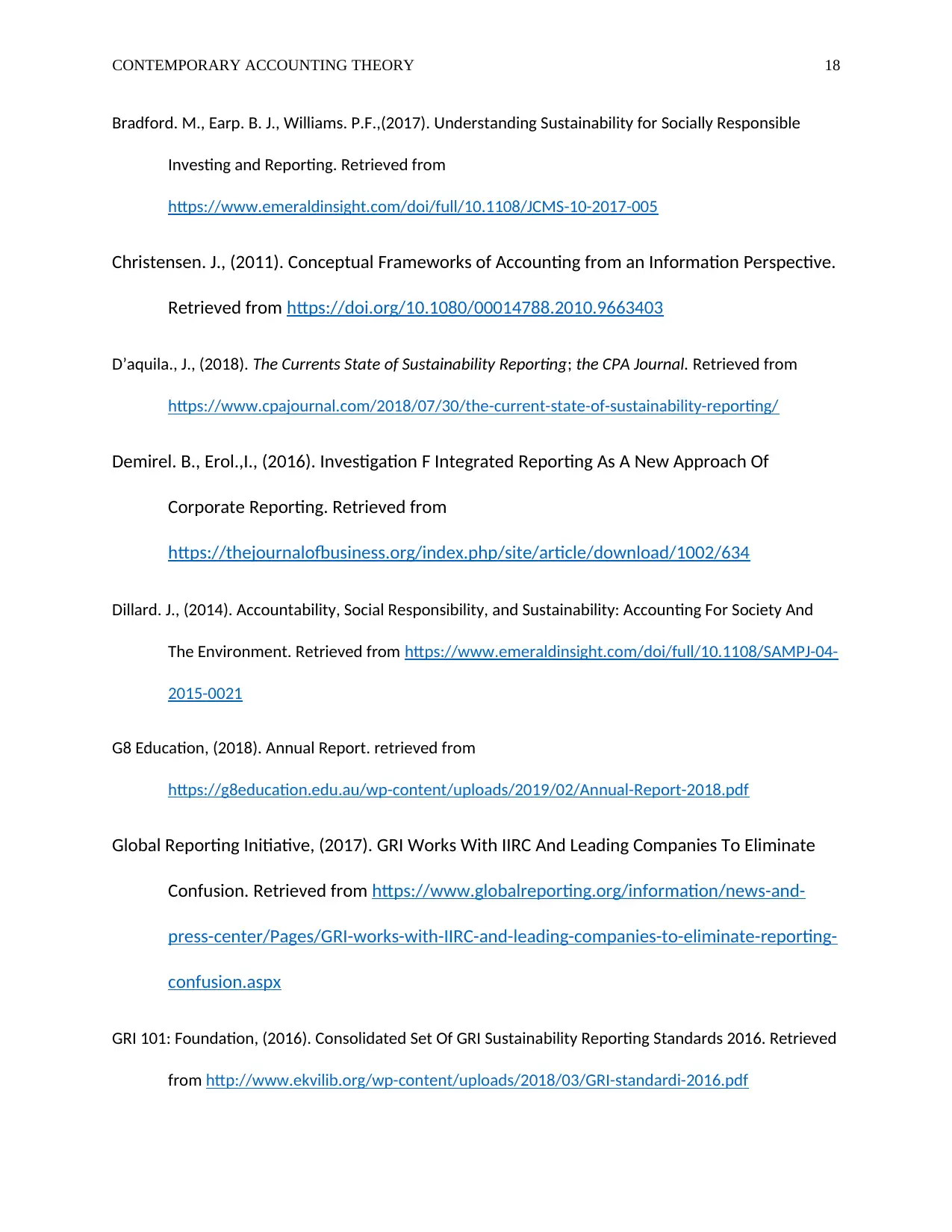
CONTEMPORARY ACCOUNTING THEORY 18
Bradford. M., Earp. B. J., Williams. P.F.,(2017). Understanding Sustainability for Socially Responsible
Investing and Reporting. Retrieved from
https://www.emeraldinsight.com/doi/full/10.1108/JCMS-10-2017-005
Christensen. J., (2011). Conceptual Frameworks of Accounting from an Information Perspective.
Retrieved from https://doi.org/10.1080/00014788.2010.9663403
D’aquila., J., (2018). The Currents State of Sustainability Reporting; the CPA Journal. Retrieved from
https://www.cpajournal.com/2018/07/30/the-current-state-of-sustainability-reporting/
Demirel. B., Erol.,I., (2016). Investigation F Integrated Reporting As A New Approach Of
Corporate Reporting. Retrieved from
https://thejournalofbusiness.org/index.php/site/article/download/1002/634
Dillard. J., (2014). Accountability, Social Responsibility, and Sustainability: Accounting For Society And
The Environment. Retrieved from https://www.emeraldinsight.com/doi/full/10.1108/SAMPJ-04-
2015-0021
G8 Education, (2018). Annual Report. retrieved from
https://g8education.edu.au/wp-content/uploads/2019/02/Annual-Report-2018.pdf
Global Reporting Initiative, (2017). GRI Works With IIRC And Leading Companies To Eliminate
Confusion. Retrieved from https://www.globalreporting.org/information/news-and-
press-center/Pages/GRI-works-with-IIRC-and-leading-companies-to-eliminate-reporting-
confusion.aspx
GRI 101: Foundation, (2016). Consolidated Set Of GRI Sustainability Reporting Standards 2016. Retrieved
from http://www.ekvilib.org/wp-content/uploads/2018/03/GRI-standardi-2016.pdf
Bradford. M., Earp. B. J., Williams. P.F.,(2017). Understanding Sustainability for Socially Responsible
Investing and Reporting. Retrieved from
https://www.emeraldinsight.com/doi/full/10.1108/JCMS-10-2017-005
Christensen. J., (2011). Conceptual Frameworks of Accounting from an Information Perspective.
Retrieved from https://doi.org/10.1080/00014788.2010.9663403
D’aquila., J., (2018). The Currents State of Sustainability Reporting; the CPA Journal. Retrieved from
https://www.cpajournal.com/2018/07/30/the-current-state-of-sustainability-reporting/
Demirel. B., Erol.,I., (2016). Investigation F Integrated Reporting As A New Approach Of
Corporate Reporting. Retrieved from
https://thejournalofbusiness.org/index.php/site/article/download/1002/634
Dillard. J., (2014). Accountability, Social Responsibility, and Sustainability: Accounting For Society And
The Environment. Retrieved from https://www.emeraldinsight.com/doi/full/10.1108/SAMPJ-04-
2015-0021
G8 Education, (2018). Annual Report. retrieved from
https://g8education.edu.au/wp-content/uploads/2019/02/Annual-Report-2018.pdf
Global Reporting Initiative, (2017). GRI Works With IIRC And Leading Companies To Eliminate
Confusion. Retrieved from https://www.globalreporting.org/information/news-and-
press-center/Pages/GRI-works-with-IIRC-and-leading-companies-to-eliminate-reporting-
confusion.aspx
GRI 101: Foundation, (2016). Consolidated Set Of GRI Sustainability Reporting Standards 2016. Retrieved
from http://www.ekvilib.org/wp-content/uploads/2018/03/GRI-standardi-2016.pdf
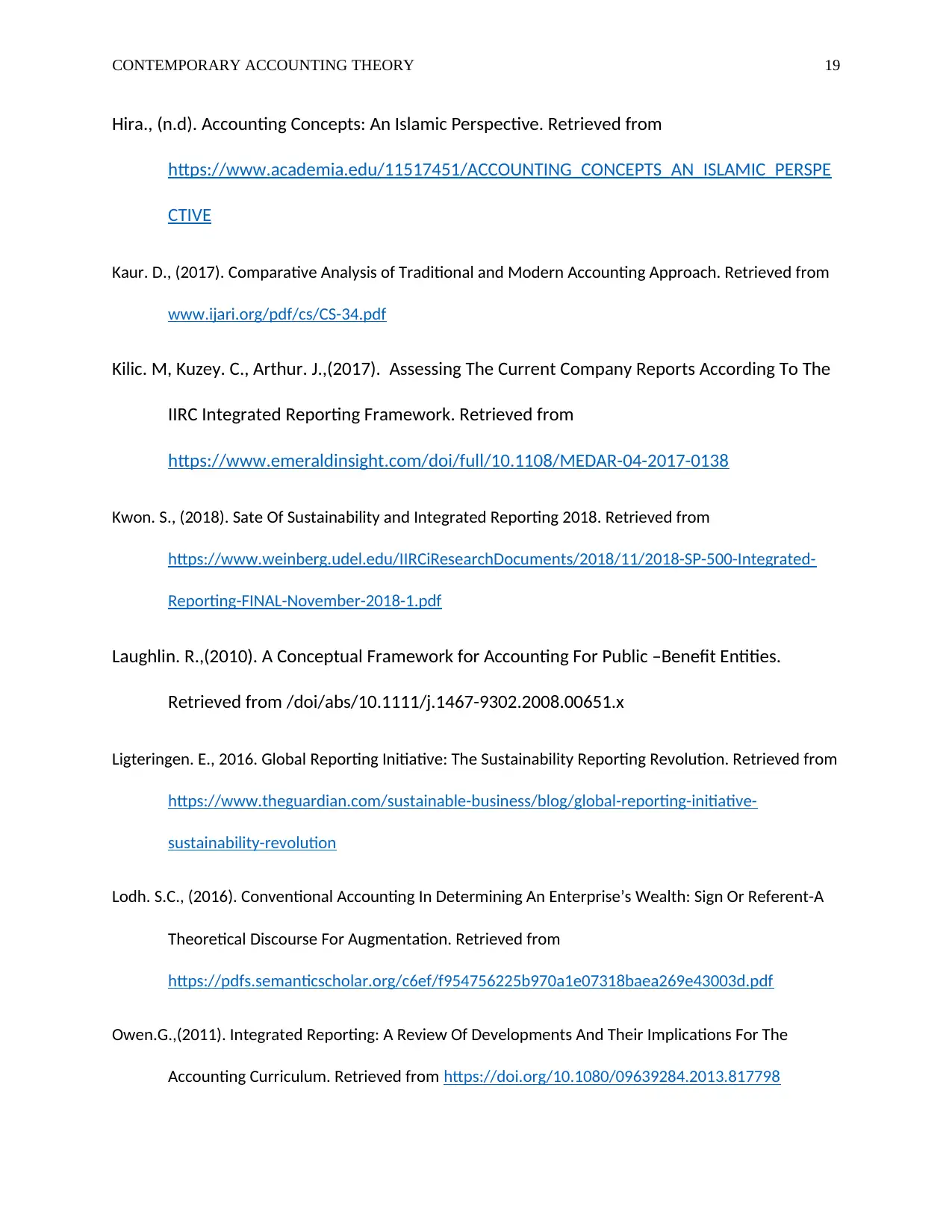
CONTEMPORARY ACCOUNTING THEORY 19
Hira., (n.d). Accounting Concepts: An Islamic Perspective. Retrieved from
https://www.academia.edu/11517451/ACCOUNTING_CONCEPTS_AN_ISLAMIC_PERSPE
CTIVE
Kaur. D., (2017). Comparative Analysis of Traditional and Modern Accounting Approach. Retrieved from
www.ijari.org/pdf/cs/CS-34.pdf
Kilic. M, Kuzey. C., Arthur. J.,(2017). Assessing The Current Company Reports According To The
IIRC Integrated Reporting Framework. Retrieved from
https://www.emeraldinsight.com/doi/full/10.1108/MEDAR-04-2017-0138
Kwon. S., (2018). Sate Of Sustainability and Integrated Reporting 2018. Retrieved from
https://www.weinberg.udel.edu/IIRCiResearchDocuments/2018/11/2018-SP-500-Integrated-
Reporting-FINAL-November-2018-1.pdf
Laughlin. R.,(2010). A Conceptual Framework for Accounting For Public –Benefit Entities.
Retrieved from /doi/abs/10.1111/j.1467-9302.2008.00651.x
Ligteringen. E., 2016. Global Reporting Initiative: The Sustainability Reporting Revolution. Retrieved from
https://www.theguardian.com/sustainable-business/blog/global-reporting-initiative-
sustainability-revolution
Lodh. S.C., (2016). Conventional Accounting In Determining An Enterprise’s Wealth: Sign Or Referent-A
Theoretical Discourse For Augmentation. Retrieved from
https://pdfs.semanticscholar.org/c6ef/f954756225b970a1e07318baea269e43003d.pdf
Owen.G.,(2011). Integrated Reporting: A Review Of Developments And Their Implications For The
Accounting Curriculum. Retrieved from https://doi.org/10.1080/09639284.2013.817798
Hira., (n.d). Accounting Concepts: An Islamic Perspective. Retrieved from
https://www.academia.edu/11517451/ACCOUNTING_CONCEPTS_AN_ISLAMIC_PERSPE
CTIVE
Kaur. D., (2017). Comparative Analysis of Traditional and Modern Accounting Approach. Retrieved from
www.ijari.org/pdf/cs/CS-34.pdf
Kilic. M, Kuzey. C., Arthur. J.,(2017). Assessing The Current Company Reports According To The
IIRC Integrated Reporting Framework. Retrieved from
https://www.emeraldinsight.com/doi/full/10.1108/MEDAR-04-2017-0138
Kwon. S., (2018). Sate Of Sustainability and Integrated Reporting 2018. Retrieved from
https://www.weinberg.udel.edu/IIRCiResearchDocuments/2018/11/2018-SP-500-Integrated-
Reporting-FINAL-November-2018-1.pdf
Laughlin. R.,(2010). A Conceptual Framework for Accounting For Public –Benefit Entities.
Retrieved from /doi/abs/10.1111/j.1467-9302.2008.00651.x
Ligteringen. E., 2016. Global Reporting Initiative: The Sustainability Reporting Revolution. Retrieved from
https://www.theguardian.com/sustainable-business/blog/global-reporting-initiative-
sustainability-revolution
Lodh. S.C., (2016). Conventional Accounting In Determining An Enterprise’s Wealth: Sign Or Referent-A
Theoretical Discourse For Augmentation. Retrieved from
https://pdfs.semanticscholar.org/c6ef/f954756225b970a1e07318baea269e43003d.pdf
Owen.G.,(2011). Integrated Reporting: A Review Of Developments And Their Implications For The
Accounting Curriculum. Retrieved from https://doi.org/10.1080/09639284.2013.817798
Paraphrase This Document
Need a fresh take? Get an instant paraphrase of this document with our AI Paraphraser
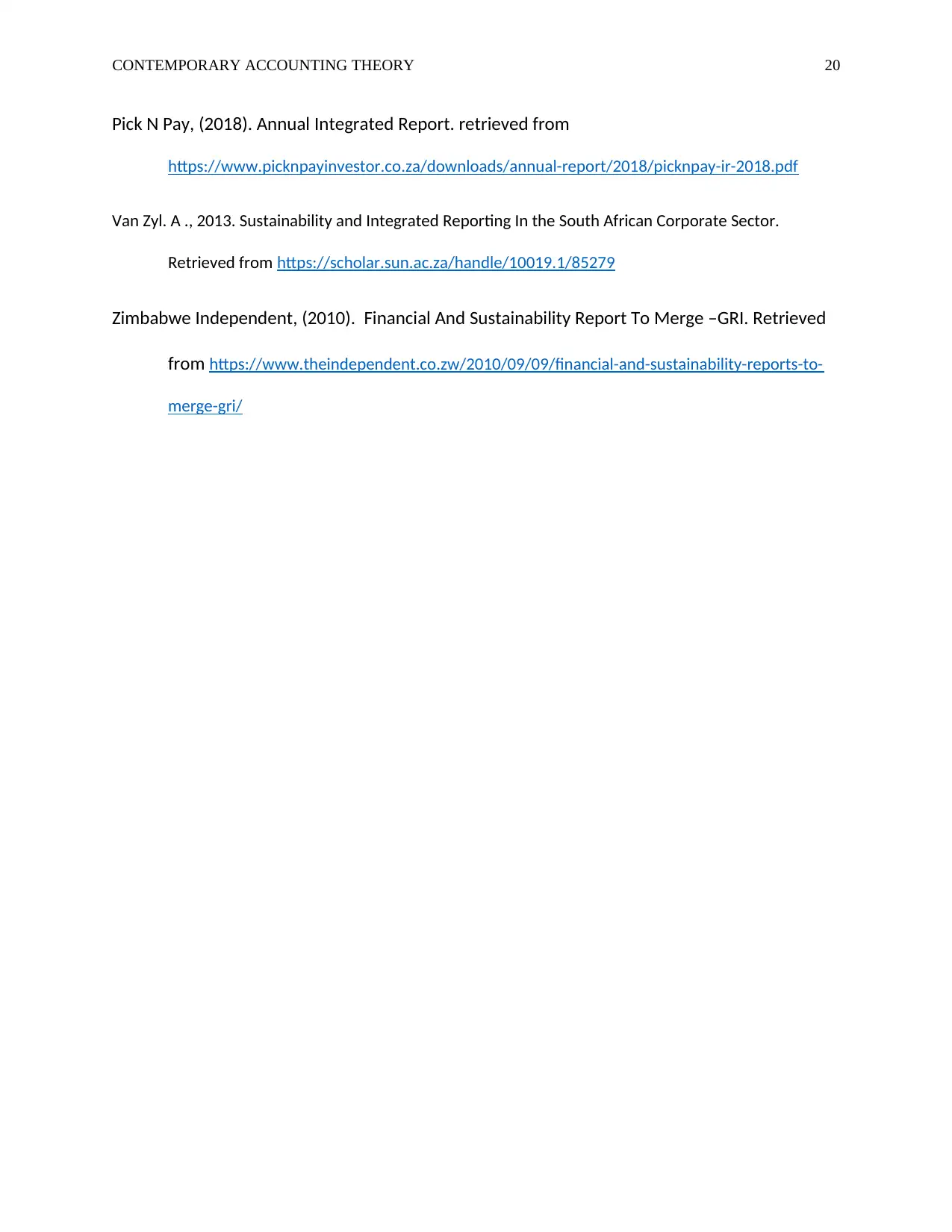
CONTEMPORARY ACCOUNTING THEORY 20
Pick N Pay, (2018). Annual Integrated Report. retrieved from
https://www.picknpayinvestor.co.za/downloads/annual-report/2018/picknpay-ir-2018.pdf
Van Zyl. A ., 2013. Sustainability and Integrated Reporting In the South African Corporate Sector.
Retrieved from https://scholar.sun.ac.za/handle/10019.1/85279
Zimbabwe Independent, (2010). Financial And Sustainability Report To Merge –GRI. Retrieved
from https://www.theindependent.co.zw/2010/09/09/financial-and-sustainability-reports-to-
merge-gri/
Pick N Pay, (2018). Annual Integrated Report. retrieved from
https://www.picknpayinvestor.co.za/downloads/annual-report/2018/picknpay-ir-2018.pdf
Van Zyl. A ., 2013. Sustainability and Integrated Reporting In the South African Corporate Sector.
Retrieved from https://scholar.sun.ac.za/handle/10019.1/85279
Zimbabwe Independent, (2010). Financial And Sustainability Report To Merge –GRI. Retrieved
from https://www.theindependent.co.zw/2010/09/09/financial-and-sustainability-reports-to-
merge-gri/
1 out of 20
Related Documents
Your All-in-One AI-Powered Toolkit for Academic Success.
+13062052269
info@desklib.com
Available 24*7 on WhatsApp / Email
![[object Object]](/_next/static/media/star-bottom.7253800d.svg)
Unlock your academic potential
© 2024 | Zucol Services PVT LTD | All rights reserved.





